#and doing justice to the complexity of the people who lived and served through it
Explore tagged Tumblr posts
Note
A stans conveniently forgetting that she doesn't want to be a lady in the first place. A would probably be very disappointed with them and would be the first to protest LOL
If we didn't have Sansa, Arya's arc could be a very bitter-sweet path of disillusionment and sober acceptance of duty.
She runs out on lessons and hates the life prescribed for a lady, is comfortable with her privileges while ignoring the accompanying duties. She ignores class boundaries because she can - without understanding the power and privilege she retains unlike actual smallfolk. She is violent when she's upset, impulsive, inconsiderate of the needs of others (unless she personally likes them). (While also being sweet, curious, funny, sensitive, obviously.)
And then she gets adventure and travel in the most horrendous way, all her naive dreams destroyed. Just injustice, war and murder. And when she eventually makes her way home, she willingly takes on the duties she had hated. Sitting still, accepting contrary views without immediate blind refusal, reading and studying, negotiating, stationary administrative work, complex decisions, patience, prudence, self-control, marriage and children, sacrifice of her freedom...
All lessons learned through pain and suffering on her travels. A subdued, somber Arya who turns her scars into lessons and gives her life over to serving her people, no matter how she yearned for something different.
But.
Sansa exists. Who has a different arc, going from being perfectly raised to do the job of a consort (with all the attendant study and diplomatic skill), through observation, painful mistakes, and growing experience, to realize that she cannot take refuge in passivity, she needs to exercise power and privilege when she has it in order to achieve the kind of justice or harmony she wants to see in the world. A reluctant ruler, who is equiped with the necessary education and skills, but needs to develop the determination and confidence to act.
This alternative frees up Arya for a much happier ending better suited to her skills and desires, as well. A wiser, more patient Arya, more aware of the power structures and her own privilege, who doesn't have to restrain her boldness as a politician but rather can exercise it as a traveler, a constant representative of the interests of the smallfolk, as an explorer, as a diplomat in the interest of the North, a living legend, Oberyn's Northern counterpart.. just anything that doesn't tie her down with paperwork and the minutiae of administrative necessities.
GRRM loves Arya. I know which ending I think is more likely.
100 notes
·
View notes
Text
"We need more complex characters!" You guys couldn't even handle Gale Hawthorne.
This is going to be a controversial post and probably very long, but I am and have always been a Gale Hawthorne defender. Not necessarily an apologist but I am a firm believer that the amount of hate he receives through-out the series is largely unwarranted.
I do think this is partially due to the fact that a lot of people who read the books did so when they were too young to fully understand the message. It being marketed as a young adult uprising story, similar to other dystopian series released at the time meant that the critique of politics and war theory wasn’t something entirely comprehensible to the audience it was aimed at. This is partially why Gale versus Peeta is minimised to a simple love triangle when it holds so much more nuance than that.
As I said, what a lot of people seem to do when we look at Peeta versus Gale is treat it entirely as a love triangle and minimise the nuance of the two characters and how they work against each other. Both are symbols of the two sides of war and in my opinion are meant to show Katniss a middle ground in her morals and what are the "justified" lengths someone is willing to take in order to achieve relative peace and freedom.
From the beginning of the trilogy we get an idea of the society that these characters live in which I believe is best shown through the tesserae system. Immediately it is apparent to the audience that district twelve is in extreme poverty with food being used as a manipulation tactic by the capitol. Gale, with his father dead and three younger siblings, is forced to have his name in the reaping forty-two times. This sets-up the world view that will shape these two characters and their paths for the rest of the books. They live in a system where you must pick between starving to death or increase your risk of dying in the arena. Gale is quick to condemn the capitol and suggest a way to rebel, saying he and Katniss should run away. Katniss at the beginning of the books has become complicit in a system she cannot change. She doesn’t think that voicing her anger will change anything and so she opts to stay quiet, this causes her to turn down Gale’s wishful request by pointing out the lack of practicality in his plan. Suzanne Collins, with this unsuspecting conversation, foreshadows Gale’s role in the books and in Katniss’ life.
Inherently Peeta serves as Katniss’ moral compass or conscience. There are a lot of subtle ways this dynamic is shown with Peeta. His hope, altruism and kindness shows Katniss one outlook on war and oppression during the course of the books. We see it first when he gives Katniss the bread from the bakery. A small but kind offer with no expectations which isn’t often seen in district twelve due to the society they function in. I also find it interesting that everyone Peeta kills through-out the books is either out of self-defense or mercy. He refuses to engage in violence as that’s what the Capitol wants. This mindset is persistent throughout the books. Peeta isn’t opposed to the revolution but he is firm in his stance that they should always do everything in their power to do the right thing and he believes that violence and sacrifice is not the right thing.
If we look at Peeta as Katniss’ conscience/moral compass, we can look at Gale as her sense of justice and rage. Gale, like Peeta, actually seems to be a very loving character, raising his family after his fathers death, Putting his name into the reaping a multitude of times in order to feed them and his love for Katniss (which he definitely had even if he didn’t do so in the best manner) The first real thing we learn about him past being Katniss' friend is that he is sacrificing his safety to feed his family. From the beginning we know Gale hates the Capitol and wants to rebel and after Katniss goes into the games he is forced to play along with Capitol propaganda, get brutally punished by Peacekeepers and watches district twelve get destroyed. His disdain is only amplified as the books go on and the tyranny of the Capitol persists. He believes that the ends always justify the means, even if it means extreme violence and sacrifice. He is incredibly angry and having not met anyone from the Capitol like Katniss and Peeta, struggles to humanise the casualties of the war.
Both of these outlooks are shown very clearly in the Mockingjay. Despite Peeta not agreeing with a violent rebellion, what I feel convinces Katniss to partake in it is when she sees Peeta on TV after being kidnapped by the Capitol. As I’ve established I feel Peeta is representing her conscience and what is considered the “right thing” to do. Katniss is convinced to join the rebellion in order to save her conscience, Peeta. Joining the rebellion, which Gale is a major part of, is the first time I think we see Suzanne Collins trying to convey that neither side is “right” and that to win a war there needs to be a middle ground.
Katniss is us as we watch both viewpoints and decide where we fall on this spectrum. We are shown the downsides of both ideologies. With Peeta getting hijacked and Gale getting dubbed the "Prim Reaper" by fans. As I’ve said Peeta isn’t un-political, but contrary to Gale he tries to rebel without violence but manipulation of the media. We see Peeta waving out the window of the train trying to charm Panem and again in the interview he plays along with Caesar's jokes. He aims to humanise himself and Katniss to Capitol citizens when he mentions the crush he has on her. He does so again when he says his infamous “if it wasn’t for the baby” line. Now I could give an in depth discussion on the commentary behind this line alone but not today. The main point I’m getting at is that Peeta knows how to play the media. We see that after this line, suddenly the Capitol citizens no longer agree with the Quarter Quell or the idea of the hunger games.
Peeta becomes a beloved figure because he does not blatantly voice his rebellion. It’s so subtle that the Capitol Citizens see him as complying to the regime with a joking smile as he discusses something as mundane as the smell of the showers. He talks about how the showers in the Capitol are much nicer. He is playing up to the idea that Capitol citizens believe, that they should feel lucky to be where they are and be treated so nicely. They are not aware, unlike Snow and the other tributes, that everything Peeta says in an act of subtle rebellion. He comes across as humble and charming and a little cheeky. In TBOSAS Snow comes up with ideas to get more people to watch the games. A quote directly from him explains why Peeta’s tactic works so well.
“If we need people to watch we should be letting them get closer to the tributes before the games. To make the stakes personal.”
Peeta never clearly insults or condemns the Capitol making it so no one can recognise his want for a revolution. He becomes personable and likable in order to plant the seeds in the minds of the viewers by being outwardly complicit yet lacing it with a message. When he says that he can never be with his crush because they’ve both gone into the arena together, it saddens the citizens who are rooting for him because even if he does win, his crush dies in the arena, and if he doesn’t he never gets to be with her to begin with. To the viewers it's a movie and you root for a character (much like it is to us as the audience) but in their world, their favourite tribute dying doesn’t hold weight in the same way it doesn’t hold weight to us because at the end of the day they are fictional characters. This perpetuates what we already know, that the Capitol citizens are so desensitised that the tributes aren't real lives or people. There is definitely a message behind this but this post is already ridiculously long so I’ll save that for another time.
We know that the citizens don’t react well to condemnation when Johanna and Beetee speak negatively upon the Quarter Quell and we hear the crowd getting angry. Peeta takes the same approach that garnered him sympathy and love in his first interview when mentioning his crush on Katniss. In "Catching Fire" he says the line “We’ve been luckier than most. I’d have no regrets at all.” This is him once again playing humble and lovable and he makes sure never to blame or speak negatively about the Capitol or the Games themselves. When he says “if it weren’t for the baby.” it doesn’t come across as rebellious but as a genuine unfortunate coincidence. Peeta is an adored undercover Rebel who the media and Capitol Citizens trust to be loyal and well-meaning and also put on a good show
Whilst this tactic worked well in Catching Fire, with Capitol Citizens needing to be mollified, not because of someone speaking negatively about them but because they are genuinely enraged at the circumstances, it is used against him when he is hijacked and he is forced to ask for a Ceasefire in an interview with Snow. Because he is now seen as a trusted Capitol Darling who is known to perform well on TV, no one suspects that he might be saying these things under duress. Seeing this interview pushes Katniss to be the symbol of the revolution. Her symbolic conscience is having his own non-violent form of rebellion used against him and also getting tortured and in order to save him she realises that sometimes violence is necessary.
SOMETIMES being the key point and why Gale is there to show that the other side of the spectrum is not good either. I feel like a lot of people like to point out that Peeta also lived in district twelve and didn’t react in the same way that Gale did. I need to point out that whilst both of them grew up in poor conditions, Peeta lived in the Merchant’s village as the Baker’s son. This is not to say that he didn’t have a hard life. Katniss learns that they couldn’t afford most of the ingredients they baked with and lived off of stale left-overs but we can also infer that the family was never so poor that they were on the brink of starvation like Katniss and Gale have faced. (The way I’m speaking implies that I think the food conditions for anyone in twelve or the other districts were okay. They were not, I’m speaking relative to the world and characters in this conversation.) Gale, in order to put food on the table had to sacrifice his chance of safety from the arena and have his name in the reaping forty-two times and I think this gives an interesting differential between the two when we’re discussing why they took such different paths in their reaction and stance on the rebellion.
Gale believes that anything they have to do in order to take down the Capitol is necessary, even if that means sacrificing people along the way. He is one of the leading voices of the rebellion and chosen to be Katniss’ right hand when she agrees to become the symbol for it. He is the total extreme of the measures one is willing to take and we see Katniss struggle with this a lot. Suzanne Collins took Peeta out of Katniss’ life in the books as a way to explore Gale’s ideology more. With her conscience gone, it leaves Katniss to decide on her own what she deems just action in this fight. The longer Peeta is away the more violence we see Katniss use. When the rebellion goes to district eight, we see her fighting as the circumstance permits. The difference between Katniss and Gale is that Gale doesn’t see the Capitol citizens as people but as numbers to win the war. I honestly don’t think this is absolutely crazy for him to do. Gale, unlike Katniss and Peeta, has never met anyone from the Capitol, and hasn't had the opportunity to humanise them like they have. Given that the Capitol are the people who view the deaths of the children from the district as entertainment and who put them in that environment, I find it hard not to be sympathetic to his outlook. It is not to say it is the right outlook but one I think can be understood.
There's a point in the book where Katniss comes across a Capitol citizen and when she goes to speak in order to warn people of their arrival. Katniss shoots her through the heart. She does this to the woman because if she doesn’t, they will almost certainly be caught, tortured and killed. Before she does this she describes how the woman looks. She isn’t just a number to Katniss, she is a human who she has killed. This is one of the best examples of the middle ground of the book and poses a question. Was it morally justified for Katniss to kill this woman? Most of us would say yes given the alternative. This is Katniss straying towards Gale’s view where the ends justify the means but the description of her beforehand, the humanising, that’s Peeta pulling her back to the middle. Yes, the woman had to be killed in order to protect Katniss and the rebels but she also acknowledges that it was A PERSON she killed, not a just another tally mark in aid of ending the Capitol.
It’s now time to discuss what we’ve all been waiting for. Prim Reaper.
Now, this is one of those conversations that I don’t think I’ll win anyone over if you don’t already agree with it to begin with. I do not think that Gale is the person to blame for Prim’s death. He was definitely complicit in it with the creation of the bomb, but if that’s the reason everyone blames him for her death, why not blame Beetee too? I also think it's worthy to note that Gale did not authorise the attack that killed Prim. We learn that he didn’t even know it was a plan, and it places doubt on whether it was actually Gale’s technology that killed her in the first place. The reason Suzanne Collins killed Prim was to show, like with Peeta getting hijacked, that too much of one ideology will eventually result in failure. Killing Prim, a character we know, rather than a group of random healers, portrays this enough for both Katniss and us as the audience to entirely rule out Gale as a plausible option in both his war tactics and as a love interest. Prim’s death is when Katniss, through personal loss, realises that whilst violence is necessary, sacrifice to the extent that Gale views as sufficient is no longer justified but rage fuelled vengeance.
To me, blaming Gale for Prim’s death is like blaming the gun rather than the person who pulled the trigger. Gale is as much of a victim of the Capitol as anyone else in the books. He becomes a ruthless revolutionary not because he is a horrible bloodthirsty monster but because he is a teenager raised in a society where he’s always been forced to make sacrifices in order to keep himself and his family alive. If the Capitol and the games did not exist, Gale would never have been in an environment where he had to become so desensitised. Is he a good person? No, but is he a bad one? Definitely not. He is there to show how any extreme ultimately results in disaster, as is Peeta.
The scene where Katniss shoots Coin and leaves Snow to be mauled to death by the citizens is where this attitude is best shown. The suggestion of a game for the Capitol children is completely obscene to Katniss. She knows that Coin is extremely similar to Snow. One could say they’re two sides of the same coin…! She chooses to kill Coin in order to achieve peace. These are the two ideologies finally settling in the middle ground. Ending the cycle of violence to achieve peace with one final violent act. It’s hard to predict how the books would’ve concluded without Gale. Would Katniss have rebelled so publicly in catching fire were it not for Gale’s influence? Would she agree to be the Mockingjay? Would Peeta’s rescue mission be successful if Gale hadn’t been the first to volunteer for the team? Would Katniss have shot that citizen or let their location be given up and have it ultimately result in their death and torture? Would she have killed Coin or let the tyrannical cycle continue? Obviously I can’t answer any of these questions because we simply don’t know what the books or Katniss would look like without Gale’s presence because he is important. He is fundamental in the war efforts, whether his actions are ethical or not.
I think the final note I want to leave is what Katniss thinks the final time we see Gale in the trilogy. Katniss, right before she goes to kill Snow and ultimately decides to kill Coin, speaks to Gale in the aftermath of Prim’s death. He hands her the arrow she’s meant to use, which I think is symbolic, the final act of violence handed off to her by her sense of vengeance before they never see each other again. After he leaves she thinks.
“I want to call him back and tell him that I was wrong. That I'll figure out a way to make peace with this. To remember the circumstances under which he created the bomb. Take into account my own inexcusable crimes. Dig up the truth about who dropped the parachutes. Prove it wasn’t the rebels. Forgive him. But since I can’t, I guess I’ll just have to deal with the pain.”
Katniss can’t forgive him because it’s just too personal, but she understands why he did what he did, knows that he did what he felt he had to do in the situation he was dealt. Do you really think Suzanne Collins aimed to villainise Gale? I don’t think so. She is too complex a writer to make us hate a victim of oppression. Katniss’ thoughts after their final interaction doesn’t scream to me that she thinks Gale is a villain of the story. Just another victim who ultimately went too far in their attempt to reach their goal. The line “Remember who the real enemy is.” is so consistent through-out the series that it baffles me that people have decided they hate Gale more than Coin or Snow. Gale Hawthorne is by no means a perfect person, no one in this book is. But he is not a bad person either, he’s simply a boy who couldn't see the middle ground through his need for vengeance against an oppressive power.
All that being said I may have completely missed and I am entirely open to hearing opposing opinions of this discussion. These books are so complex and there is no way I could do an entire in depth analogy of Gale or Peeta or their environment. That being said I hop you enjoyed my attempt to articulate my thoughts on Gale
#the hunger games#the hunger games catching fire#the hunger games mockingjay#gale hawthorne#peeta mellark#katniss everdeen#suzanne collins#controversial take
36 notes
·
View notes
Text
Bad End: Kuro Ryuko

The world shook.
Screams. Panic. Futile commands filling the air, as what Royal Warriors still lived, tried desperately to fight back. What was the point? Didn't they realize? They had brought this on themselves. We all had. I... I had TRIED. Powerless as I was. Trapped as I often felt. I had TRIED.
In the face of The Black Dragon... I knew it to be no excuse.
My soul burned beneath it's cry. That terrible roar, which echoed condemnation. Damning. Our crimes could not be hidden. Our sins unforgivable, rotting behind the pretty lies we had told ourselves. It SAW us for what we were. Beheld our very SOULS.
The Dragon was DISGUSTED.
All I could do was run. Weep. Cling to the hands of the other serving girls, as we tried desperately to survive. Forgotten in the panic, by so called greater men, we had only ourselves to count on. The servants pathways were already choke points. Death traps. Several had been hit, if the pillars of smoke were coming from where we thought the were.
The world shook. Hanako choked on her scream, two girls down. The subtle face paint she was always so proud of, a mess, streaming like tears of ash down her lovely face. Aiko had fainted. Tried so, SO hard not to. Clung to consciousness with vicious painted nails. But the panic had been to much, her health too poor. Her sister carried her now.
The world shook. We were going to die, weren't we? A crowd of forgotten things. Not even good enough to be people in the eyes of our masters. Just maids. Serving girls. Born peasants and dead property. Caught beneath the wrath of a Dragon whose eyes saw us, but who mercy could not comprehend the complexity of mortal cages. The chains we could not see.
Crashing. Fire. Roars.
The World Shook.
It was excuses, in the end. We had a choice. Simple as it was. Obedience or Death as it may have been. To the Dragon morality? We were to have chosen Death. There is no compassion for cowards. Mercy for the cruel and self-serving. Not even, if it is all you can do, to survive. Perish instead, die proudly, Be Dragon, says the Black Dragon.
Of all the Dragons, THEY are not the kind one. Not the merciful nor sweet nor wise. THEY are Justice. Vengeance. Debts paid as they are due. They were feared but no one could get rid of them. For who could rightfully argue against Justice? Debts paid? What, people would ask, did you have to hide?
Everything. They always did. And they DISPISED the Dragon for it. For being impossible to fool. Impossible to bribe. Their Champion's an avatar of their Will. Endlessly carving paths of destruction through sin and debauchery, usually paid for at the cost of those who served. To see the Black Dragon? Was to know Justice was coming.
Like the fist of a wrathful God. The mauling of a beast. Burning through like a wildfire, leaving nothing but ash in their wake.
It was an isolating life. Terrible. I... I remembered, Before this life, Another. Bits and pieces. Disjointed at first. Yet over the years I have come together. Social isolation is a torture. I KNOW this. People go insane. And... and a dragon is not human. Could not possibly be enough, even if they WERE excellent companionship. People need support structures.
So I tried.
Volunteered to be the one to bring Kuro Ryuko her meals, much to the relief of others. Tried to sneak treats and festival snacks in. Little toys and books borrowed from the central library that maybe they would like. I tried. Again and again. Everything I could think of. Quietly and subtly, so as not to get punished. So I would not be stopped. And...?
It amounted to nothing.
Silence.
Did I become too comfortable? In my habits, too arrogant? That I forgot exactly how DANGEROUS the forces I meddled with, truely ARE? At worst... at WORST, I expected her to ignore me. She had such even temperament. A calm, smooth voice. Still and ponderous, like deep waters. How? HOW?! I could not-! Did NOT-!
Not far behind our group, a great expanse of wall exploded to the side, as a god-like section of the Black Dragon's body crashed through it. One small part of a single twinning loop. Insignificant compared to the full beast, which seemed to consume the sky itself.
It was MASSIVE.
We would have died instantly.
Choking on our screams, desperate not to attract notice, we threw ourselves forward. Nearly tripping on our skirts. Two of us DID, but were instantly hauled back to their feet by friends or nearby survivors before they could fall. No one. NO ONE, was getting left behind. It wasn't long now. W-we could do this. We HAD to do this. Survive. Escape. Whatever comes next, so be it.
There were supposed to be other Dragons. To Balance each other. Had they turned on us too? Were they dead? Did it even matter anymore? None of us had ever been so glad for Madame Shimei's secret gaurd lover before, the one we all knew about but all pretended we didn't. They were cute together. Everyone hoped they would marry.
I...I hoped he wasn't dead. It would break her.
There! The outer wall! I could sob with relief. The secret side entrance was open. Madame's Gaurd still there, alone. Frantically searching until he laid eyes on her. Desperation melting into unspeakable relief. He starts forward. We... we are so close...!
CLAWS.
The Dragon's hand, smashs down between us. Crushing everything. Cutting us off from any escape.
Now. NOW we scream. There is no point not doing so. We have been found. Barely visible, past the crushing force, Madame's gaurd appears alive. Unhurt. Refusing to run and leave her. They are not young, it was no grand tale of beauties, but in the face of certain death? He has shown what sort of man he is. She begs him to go. Live. It sounds so very far away, as I follow the line of that limb. Up and up and UP.
Titanic and seething, the Black Dragon's eyes glow. My soul laid bare. Every failing, every mistake, each injustice. How... how worthless I am. I... I deserve this. How dare I run. How dare not pay for my sins? I deserve to burn. We all deserve to pay for our-...
"Not that one. That one's mine."
I am on my knees. Tears streaming down my face. The others weeping, cowering, praying around me. Only a few made the mistake of actually looking the Dragon in the eyes. The others beg them to wake up. They won't. Trapped in a terrible trance, they weep. It take me a long moment to even register my freedom. The source.
Kuro Ryuko. I know that voice. Who else could it be?
She stands, the picture of Judgement and Cold, Calculated, Wrath. Long black hair, blowing in the wind generated by the Dragon's mere presence. Their mere WEIGHT upon the world. Her eyes glowing like suns from within. Golden beacons of light, inhuman marks of absolute power. She... She is looking at me. Why is she looking at ME?
"I have decided No More." Her voice echos in the silence like a command, the declaration of an empress. "They will not listen. Think they can hide. Pester and pander, seek to cage me even as they poison me. Enough. I have tolerated this insolence long enough! It burns, all of it. They may start again from the ashes."
"Now come here, Mouse. We are leaving."
There are certain commands you can twist and some you can not. Some you can argue and some you can not. It depends on how reasonable the person speaking. What they will DO, should you defy them. The cost you would pay. If... if I DON'T heel like a pet? My eyes flick to the other maids. Madame makes eye contact, her horror clear. Experience has taught her EXACTLY how this must end.
Through tears, I offer her a smile. It... it will be okay. Somehow, some way, it will be... be okay. Live. Survive this. K-keep going, alright? Promise me? We have not spoken. Just gaze alone. But the grief and determination painting her face? Tells me she understands.
I'm so, SO sorry.
I get up. Face Kuro Ryuko. A perfect servant's pose. Head up, but not so far as to be haughty. Shoulders back, but not so far as to thrust out the chest. A smile that is pleasing but promises nothing, does not entice. Hands folded, ready to serve, artful not idle. Measured steps as I move forward. I remember my lessons.
Terrified. I am... I am so... so unspeakably afraid. I move regardless. Smile politely. What is one death? If the others survive. I may shake, my soul may howl and tremble, b-but my friends get to LIVE. A-And... and have I not lived before? I am being selfish. This fear is selfish. They get to live. Repeat it. Gods, we must repeat it.
They'll get to LIVE. T-They'll get to LIVE. D-Don't b-be... be...
I can not let myself cry. Refuse to show weakness NOW. Here, at the end. Before this terrible, terrible thing. Tears have no use before a beast with no mercy. I have so little dignity left. The least I can give, can HAVE, is my final memories be one of strength, in the minds of those who loved me. Lie as it may be.
There is blood on her cheek. I can see no wound. And from the angle it stains her? It can only be splatter. Shines, just faintly, with the golden sheen of an Avatar's gift. Their blessings. I guess I know, now, why Shiro Ryuko has not risen to stand against them.
They can not.
I wonder if they are wounded or simply gone.
The Black Dragon has moved its focus to me. Adjusting it's stance to do so. It clears the path and, with despair, the others flee. I... I hope they live long lives. Good ones. Would give anything to join them. But here and now, I do not turn my head. Stare straight ahead and think of nothing. Pretend my hands do not... do not shake.
I am fine.
This is fine.
Kuro Ryuko moves, jumping through the air in a way that denies reality it's laws, it's limits. What are physics to a god? Mere gravity to a DRAGON? She moves as she pleases and the world bows to her will. Touching down with the grace of a frightful hunting bird, weapon swept elegantly to her side, as she rises to regard me. We have never stood so close. Some vaguely hysterical part of me notes... huh, I'm taller then her...
"Hello, Mouse, I am your mate. We are going to be together, forever. Come." There was no uncertainty in her voice. No asking. Just absolutes, command. Her hand expectant as it hung, outstretched towards me. "This place is filthy and does not deserve you. I will find us a better one. Flowers, perhaps? A luxurious bed? You will tell me on the way. Give me your hand."
What else could I do? But obey here? So close, the Black Dragon's every breath rolls across me like waves of heated death. A subtle reminder of at who's mercy, I stand. Her skin is almost too hot to touch. Hand calloused from a warriors training. I am dragged close. Against black silks with golden trims and embroidering. A possessive arm, like steel, sliding around my waist.
She takes a moment. As though to savor holding me close for the first time. Her other hand flicking her weapon up into the air, leaving it to float, weightlessly. Just so she can bury it in my hair, which had half fallen from it's styling, during the run. Pressing her face against the side of my head. Nearly hard enough to hurt. Dragging in air, all but hissing it, through her nose and gritted teeth.
Like it's not enough. Like it will NEVER be enough.
Like she wants to craw inside my skin and wear me. Needs me. Wants to CONSUME me.
Her hands have claws. I can feel them prickling, five painful little points, on each one. Where she holds me still. Bruisingly strong. A pleased hum that rolls like a growl. Pressed close against my skin like a secret.
"Mine. Just mine now. No more patience. No more 'behave'. Just MINE. You and me. My Mouse. Pretty fidgety MY Mouse. Shy and nervous and MINE. Gonna take such good care of you. Give you everything you need. Love you, Mouse. And you'll love me."
"No matter what. I'll make sure of it."
#threepandas#yandere#yandere x reader#yanblr#reader insert#yanderecore#lesbian yandere#lesbian reader#servant reader#powerful yandere#dragon like yandere#bad end Kuro Ryuko#bad end Kuro Ryuko au
126 notes
·
View notes
Note
also hi 👉👈 i would like to hear about the allegory you're working on if i may
This took forever (sorry) but thank @artist-issues for Unlocking the Brainrot yesterday when I have not thought about this idea in like... four months. Also she told me forever and a day ago she wanted to hear it too so here is is my fren I'm tagging you now after all this time asldfjaskdfjah sorry I took forever. Its once again consumed my thoughts and now we're gonna try to figure it out again.
This is going to be very confused ramblings- if it makes any sense to you- GREAT! Tell me what's happening because I have no idea what I'm thinking or where I'm going with half of this. Also it doesn't help I haven't looked at these notes in quite a while and I'm now scratching my head over them, trying to figure out what they mean.
ANYWHOOOOO-
(do you know how hard I had to restrain myself to not put a rick-roll right here aslfjasdfj)
It'll be a fantasy allegory, in a semi-medieval (I think I want futuristic tech to show up at some point but idk) setting. Magic, cool creatures, all the good stuff.
Main Theme: Finding identity in God. You cannot save yourself or fix yourself or be your own hero. You have to place your faith and trust in something higher than yourself and submit to it since you know its better for you than your own way
Side theme: Strong friendships and sibling relationships. Literally, 👏FRIENDSHIP 👏. 90% of the character relationships will be siblings and best friends, and the other 10% will be HEALTHY MARRIED/BETHROTHED COUPLES. Sick of dumb teen romance with no substance, or bad marriages, or where dating is a dream but marrige is awful, so imma fix that.
So Plot: (hahaha.... I'm sorry. all of this is copy-pasted and messy and confusing so uhmmm good luck?)
Long story short: C U L T and getting out of them
True Religion:
Christianity to a T.
God (Adonai) - Lord, Master
Jesus (Iesous) - He comes as a humble healer to help save and draw people out from the cults. He is the one who is there for MC in her big moment of doubt, and tells her to follow Him. She and other friends that she makes along the way become the loose equivalent of the disciples. He is like a father to her, especially after being betrayed her own father, and He tells her to depart from her family to seek Him, which she does.
Holy Spirit (Sacred Flame)- described as literal flames that ‘glow’ in your soul that urge you to do things and feel close to God and stuff, can be physical symbols that literally are on your body
Cult:
Came from the True Religion and forced it out of the area totally (or seemingly so) through persecution- the cult is all that everybody in this area knows.
Bunch of different factions, each worships a different aspect of God, but not all of God. like God of Love, God of Justice, God of Anger, etc. they believe that everyone is predisposed to which aspect of God that they should worship, and are placed into which faction they should be in/serve at.
which is messed up because God is so complex and big and outside our understanding that we all have to worship all of God, not just a piece of God (which is idolatry and paganism).
Politically complex: the factions are all part of the same cult, but they have huge rivalries and are encouraged to do so by the heads of each faction, while they have a front of unity to sow chaos for the Evil One that it turns out that they are serving in the end.
Secret goal of cult by higher-ups is to remove you so far from your identity you have to submit yourself to their leadership in order to have any purpose
Each faction has a ‘base/monastery’ where the heads of the faction are, and lots of people live (and are controlled!!!) but only the most devout and faithful go there, as well as those who were just assigned to that faction to learn more about their aspect of God for a term before they go back into the world- this is where they get brainwashed. Also, ‘troubled cases’ of people who are starting to doubt/question go here to be extra-brainwashed
‘Good’ aspects of the cult are just as bad, its just shown in different and more devious ways, while ‘worse’ aspects are just more open about it
Names:
In this world, names are SUPER important. hp/pj idea, names have power
They define who/what you are- the meaning of the names
They describe what you are naturally, but also with having these names, you are more ‘gifted’ at the meaning
Ex: your name means ‘light’ you quite literally are full of light and bring it wherever you go
At birth, youre given a generic name based on your parents/who you know
Like ‘millerdaughter’ ‘Isa’s-eldest’ ‘Peterson’ etc
Until you ‘come of age’ and have a name ceremony where your ‘true name’ is revealed to you (but in the cult its chosen for you)
Revealed by Holy Spirit
Your name can have positive or negative connotations
Your True Name can change
If you stop seeking after and promoting the qualities of your name, it can be stripped from you
Like in a cermony
Or you just stop having the ability to use it and youre forced to use another
Your false name the cult gives you will never be your true name, but it is possible to ‘give up’ your true name and revert to a bad true name (forsaking your salvation) [SIDENOTE: rereading this rn I think this is very flawed and I need to fix this bc isn't isn't biblically true, however I think I WAS going somewhere good with this?? just the phrasing here is weird??? I need more time]
Or if your true name means ‘mean’ and it truly is your true name, not one that was forced on you, but you change and grow and become better, its not ‘cheerful’ or something
TRUE NAME CEREMONY
Can be planned (right after, see below) or spontaneous (in the moment of, see below)
Has to take place in a moment of or right after a deep and personal connection with Adonai and/or Jesus
A person other than you can tell you your name, once its been revealed to the both of you at once
Someone who has a deep and personal relationship with you (and spiritual authority over you?) Jesus will reveal True Names as well
You can’t name yourself basically. Adonai/Jesus/Sacred Flame reveal your name to you, and other believers have to ratify/witness it
uhhhhh this entire name ceremony idea is confusing to me too sorry
Girl (MC):
liar, thief, swindler, hustler, con artist- overall bad person.
Every time she meets someone new she has a different name, personality, and feel to her character. Basically, she is like 20 people in one, and pulls out different parts of herself for different things.
For each name she had, she felt a glimmer of the power that went with it, but it was never enough to be satisfying, because they were never really hers.
She does not know who she is, even though part of her thinks her identity is being a bad person (maybe being associated with part of this cult?) and she both hates and loves that, because she knows how empty she is and is searching to fill the hole inside of her.
She was in one of the worse factions of this cult- Jealousy maybe
Maybe she interacts with Jesus-like character who pays for her sins and helps her out???
Has sad character moment where someone she loves asks what her name is and she breaks down like, ‘i dont have a name’ cause either she never was given any name, good or bad
Big triumphant character moment is when Jesus names her- when her true name is revealed to her and she grasps it
RANDOM STARTING IDEA:
Story starts with her entrenched in this cult.
Weird stuff starts happening and she’s questioning and noticing stuff
She meets this guy Iesous who’s come to the local village and is healing and helping people, and feels an instant connection with him
Fast forward to her low moment, she feels like she’s lost everything, and is having her meltdown when Iesous comes along and tells her to follow him
She goes ‘You know what, i dont have anything to loose, and everything to gain, i trust you, i’ll follow you’
*deep breathing* confused yet? don't worry me too
Now the part where the Artist-fueled brainrot comes in- (girl idk if I should smack you or hug you for this one asdfjasdkf ack what have you done to me)
Monsters.
Remember how the secret goal of cult by higher-ups is to remove you so far from your identity you have to submit yourself to their leadership in order to have any purpose? Yeah, well...
Being able to shapeshift is considered the ultimate gift, after you’ve been devoted to the cult for years. It signifies that you are so removed from your identity that you can no longer be yourself, you can only be other people/animals, and is reserved for those who are the highest on the cult’s food chain- its a natural process that technically anyone can reach, but you need to be ‘blessed’ by a evil ritual to do it well/right or even be allowed to have it.
Or so they say.
Imma need a character pov of someone who's turned into a monster, and LOVES being one. Totally corrupted. No idea what the monster kind will be, I'll probably make one up given its fantasy and I love worldbuilding, but its gonna be BAD. And I'm not really one to write scary stuff BUT I WILL TRY. So anyway, eventually comes to realize that its not nautral, and that their monster nature is actually corruption and they've been lead astray by this cult partially, but it really and truly is their own fault, because they ENJOY this and its easy for them, and change is HARD and requires WORK and HUMILITY and stuff, but then you know somehow someway I haven't thought of yet the monster gets killed and gets redeemed by God's purity and presto bingo all better yay?
Yeah all of this monster -> good person is just allegory for people in their sin before they find their identity in Christ.
Also it'd be REALLY dope if this was the MC's brother. And then after he's redeemed and back to normal they have to rebuild their relationship again.
THERE IS MORE believe it or not this is just the abbreviated version but uhhh.... yes it's a mess xD hopefully you could understand 1% of this maybe and maybe it was fun to read? I have a lot more thinking and clarification to do ack.
#sunkissedliterarylightofchrist#asks#writing#christian#allegory#august#story idea#original story#my writing idea
8 notes
·
View notes
Text
We need to finally decolonize
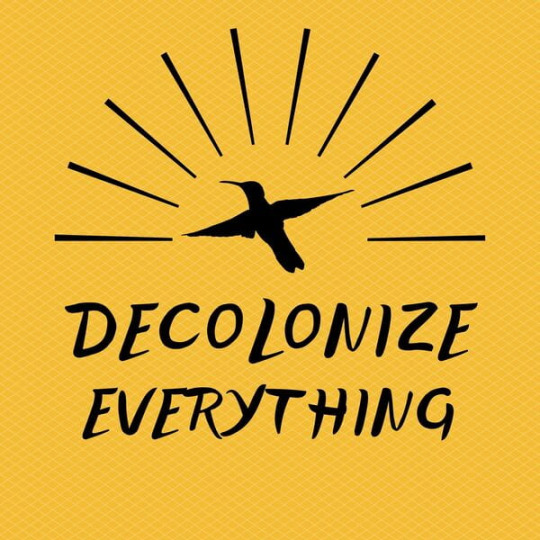
You know what? Thanks to Castlevania Nocturne I got a chance to talk a bit more about colonialism. So, let me just talk for a while a bit about decolonialization and what would need to happen for that.
Also, if you are one of the white guys, who is going to whine about "Arab colonialisation, boohoo", I am gonna kick you ass off this blog, just so you know.
I think like two months ago I already wrote a bit about how colonialism has never ended. And it hasn't. For the most part a lot of land is still not only settled, but owned by settlers. This is true for the Americas (including the US of course), but also true for Australia, parts of the Pacific and also large chunks of Africa.
Additionally settlers have constructed contries and borders often to serve their needs and to allow them to assert control. This is particularly clear in Africa of course, where those straight line borders ignore both geography and original tribal lands, splitting it up and hence adding to local conflicts.
Then there is of course the general effects of the genocides that have happened through colonialism and are - arguably - still happening, given how underserved Indigenous communities are often in terms of infrastructure, but also access to justice in any way or form.
And of course once more: Slavery is still happening. Partly in mines (and the like) in countries where you do not see it - often for the enrichment of white people - and of course in the US through the prison industrial complex.
I could go on and on. But let me turn this around and talk about what needs to happen instead. How do we decolonize?
Short answer: Land back and reparations.
No, that does not mean that all settlers have to move, but that tribes get to manage and make decisions about their own land. And if they do not want your fucking pipeline on that land, there is not gonna be a fucking pipeline on the land. And if they allow it, they can charge you for the use of the land. It is their land, they get to call the shots!
And that is not only gonna be true for the US and Canada, but for all settled land that is currently held by white people.
It also means paying reparations to everyone who suffered through colonialism. The people whose ancestors got shipped around the world as slaves, but also the people whose families had to suffer through genocide and all of that.
And no, it should not only be the US to pay those reparations, but all the countries that enriched themselves on all the horrors committed. Which would also include Germany, France, the Netherlands, Spain and Portugal first and foremost.
A lot of western countries act like they are lord and saviors when they give "humanitarian aid" to the global south, even though those payments are not even a fraction of the money they made on the backs of the people living in the global south right now.
The argument against this is always: "But we do not have the money" and "it is all gonna be taken by dictators", to which I say: "Tough luck" and "who was it again that put those fucking dictators in power to prevent the spread of communism?"
I just really do not have any chill for white people going all "but the money" again. That money was stolen. So fuck right off.
73 notes
·
View notes
Note
hii just wanted to know your thoughts on regulus/mary in choices. ik its a very controversial topic in the fandom but fir me personally i love how it shows regulus' character. i feel like i'm putting this badly but i think obliviating mary after doesn't really show him wanting her to be happy or smth without her trauma but more regulus still protectinh his own in a way or not wantinh any plans in place to be ruined. like it just shows that regulus is more than someone pretending or trying to do better, but more how complex he is, and how he cares more about things that may come back to him rather than someone elses feelings. i have sm thoughts on this but it's alr so long so i'll leave it here. also mary after it happened!! i love the characterisation in choices omg.
UGH i could yap about this so much,,,
oh wait ! i have ! my main choices yaps: lily mary (i yap a lot so it's at the 1:30 mark)
BUT TO SUMMARISE:
IT'S DONE SO SO WELL!! "i dont think regulus was a very good person" "no, he wasn't. but he wanted to be. and that has to count for something right?"
IT'S RIGHT THERE !!! and i'm 99.9% sure that soph said at one point that the whole reason regulus is involved is to highlight the fact that he is Not a good person! he's not a good person and with a fic focused on morality and how the choices we make turn us into the person we are? SO important that regulus is involved here. and nope, definitely not to protect mary (though i do think there's a part of him that wanted to, but that wasn't the part controlling his actions), it's to cover his back. it's to make sure his plan isn't messed up because he's NOT a very good person, but he wanted to be. and that HAS to count for something.
even just,,, dumbledore and mary. the fact that she doesn't get justice? yes. YES. she wouldn't have. not just because irl hardly anyone ever gets justice for things like this, but because she's (1) a woc who are disproportionately affected and left behind and (2) a muggleborn in a time of drastic conflict - noone would have been on her side even if she DID press charges. mulciber and co would have won, and justice wouldn't have been served either way. BUT - dumbledore doesn't do that. he utilises this event for his own gain, he tries to get regulus to help him and he uses what happened to mary to do that. it's not just regulus whose character is devloped by this, but dumbledore's too. which,,, yk people argue and say that it's just there to DeEpEn ThE mAlE cHaRaCtErS and it's like,,, wow. because irl men have neverrrrrr made it about themselves. because irl men have neverrrrrrr used stuff like this to their own advantage nuh uhhhhh (said as sarcastically as possible)
it's a "controversial topic" because they don't GET IT!!! they don't GET that it's not "oh women shouldn't have justice!!! i hate women!!!" it's actually "hey, this world is going through a lot right now and noone is getting justice for anything and people's lives are being used as chess pieces on a board that doesn't even factor in their existence and even if it did, there's far too many choices to potentially be made that good is so hard to come by"
choices ily. soph ily.
11 notes
·
View notes
Text
Day 14 (1/2)
Lone Light
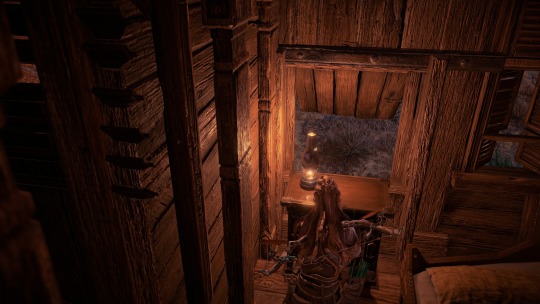
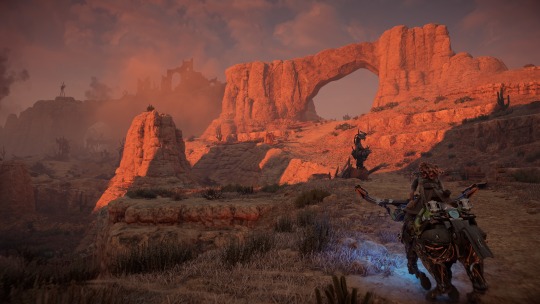
Up with the sun, of course. Most of the others in the inn did the same, being travelling hunters, even a couple of Banuk I saw stumbling around in puddles of their own spilled drink last night. Impressive. I spotted smoke and the red skull flags of a bandit camp next to a rock arch on the road. Nil was there. Is he following me, or just returning home to his homeland?
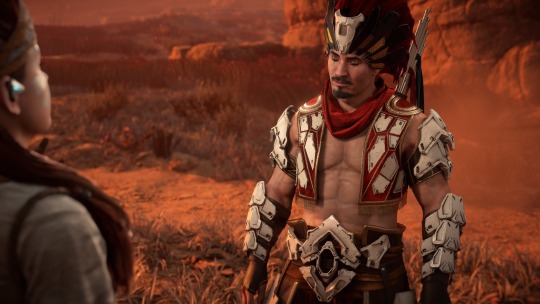
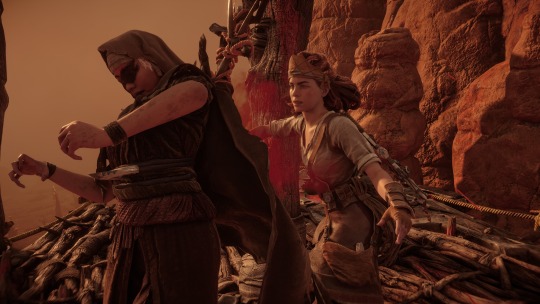
As usual, we took them out silently at first, targeting their snipers and the alarm, then the gunner, using his heavy weapon to pick off the rest in a hail of metal.
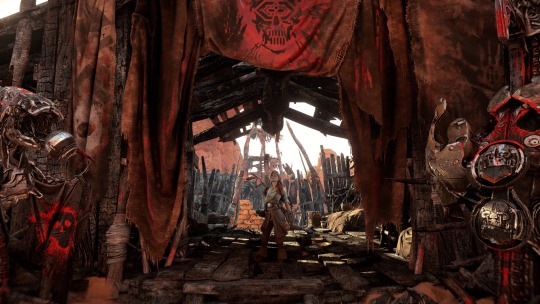
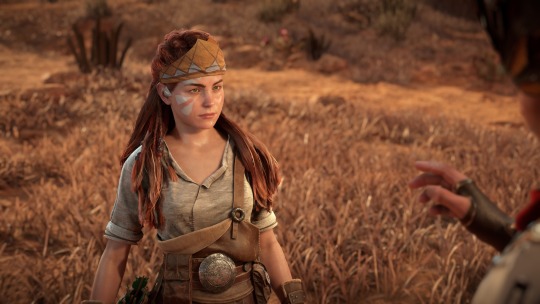
Nil is...concerning. He participated in the Red Raids, which I guess I knew, him being an ex-soldier for the Carja, but since then I've learnt more about the terror of those times for the Nora and other tribes. I can't figure him out. He volunteered a confession for his brutality during the war and served a sentence in prison. Makes more sense to lock dangerous people up than just send them away, make them someone else's problem, but I can see what Teersa meant when she called Nora practices humane.
I'm not sure if Nil was always the way he is now, but the way he tells it, it was in prison at Sunstone Rock that he honed his outlook on the world. He doesn't care who he kills, as long as he gets to do it. It's a thrill for him, it seems. Strangely he seems perfectly content to let me take the lead in the camps. Is he testing me? Looking for a spark in my eyes that he feels in his own? He wants me to enjoy it too. Maybe...maybe I do. A well executed hunt is always fulfilling, and the lives of the people in these lands would be better off without this red smoke stain with its warring and plundering. Maggots, Nil called them.
I wouldn't feel this way killing innocents, of course. I've only ever killed killers, people who kill for sport or personal gain. There's justice in that. I know there is.
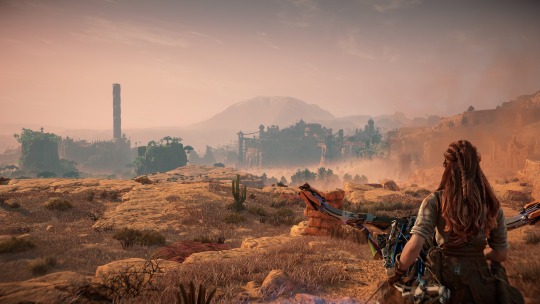
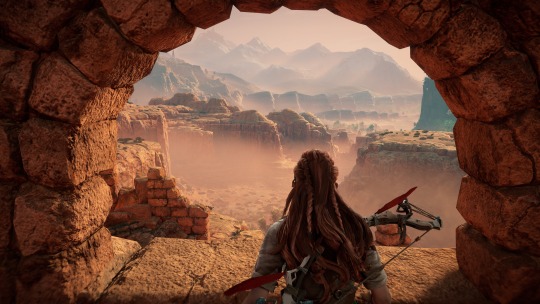
Meridian from over the rise, and a huge machine stalking the area to the right—a Thunderjaw. I've heard of them, Erend mentioned them. One of the new, deadly machines brought forth by the Derangement. Rested a while in some nearby ruins.
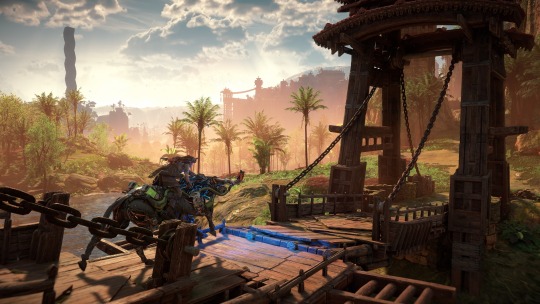
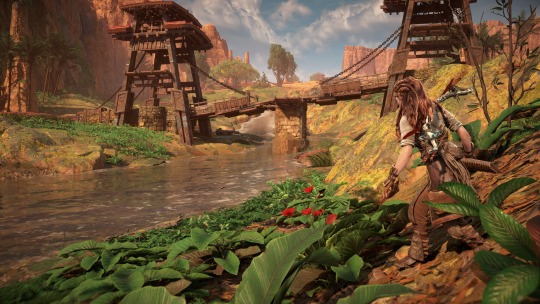
Things got greener the further I rode down toward the river. I stopped my mount at a crossroads, the way to the city being crowded and narrow, stocking up on herbs by the riverbank.
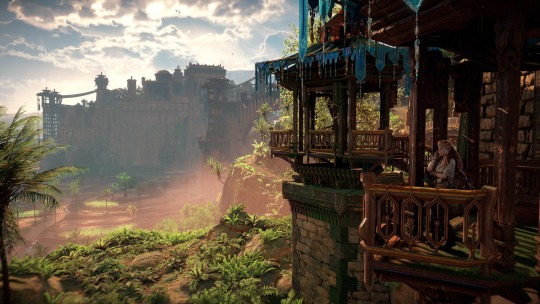
The view from the mountain path.
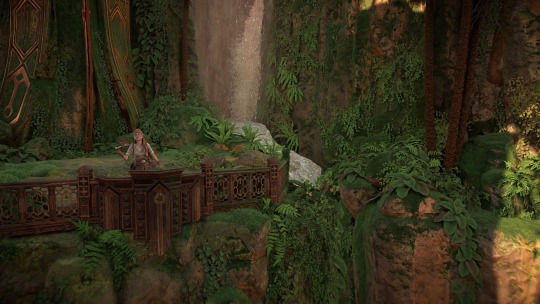
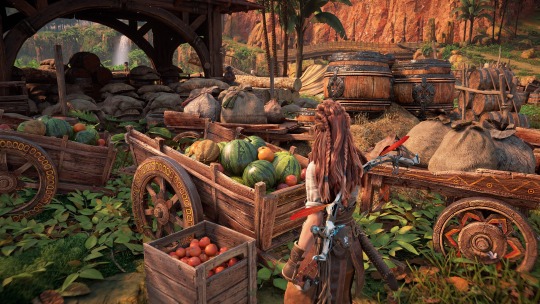
There was an encampment at the top of the mesa loaded with traders milling around with their wares, carts of food, fabrics, machine parts and wandering animals. The way to the city was blocked by guards, searching all stock that passed through. I heard mutterings that even Carja were being searched, something about keeping all outlanders away. Hard to tell what was law and what was only hearsay. I'm not going to let these Carja stop me from getting to Olin.
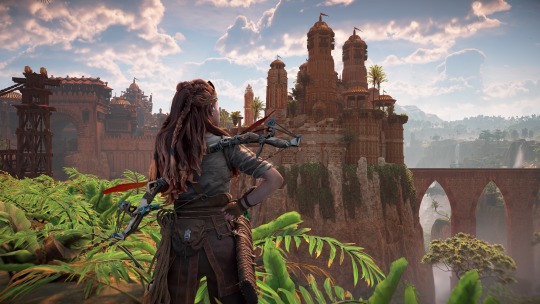
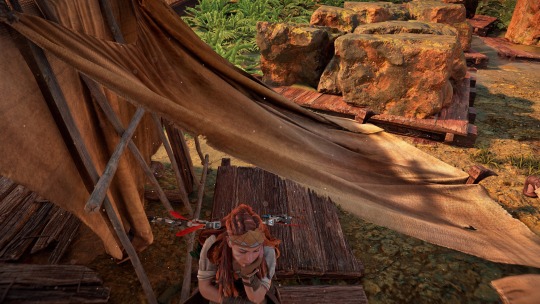
There was a huge, golden complex of towers atop an edifice separate from the city proper. Must be the Sun King's residence. With the way Irid and the other Carja talk about him, I guess I can't be surprised—they worship him, but how can one man be deserving of all that wealth? The people out here have sweat on their brows and mud on their soles.
I rested in the camp, hoping to wait out the commotion at the bridge entrance.
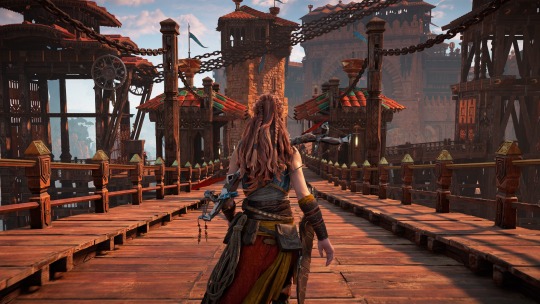
No such luck. I figured I'd have a better chance slipping through in Carja clothes (scrounged up the shards to buy their silks), but my Nora Seeker mark and weaponry will probably give me away. The bridge was a marvel of construction: huge chain pulleys hoisting moving platforms up and down.
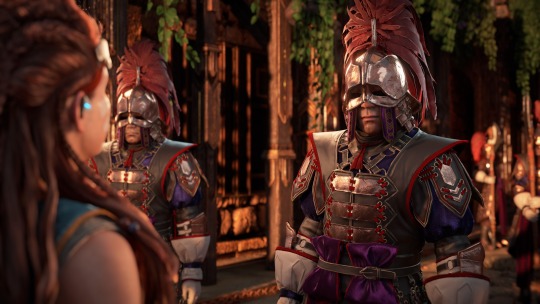
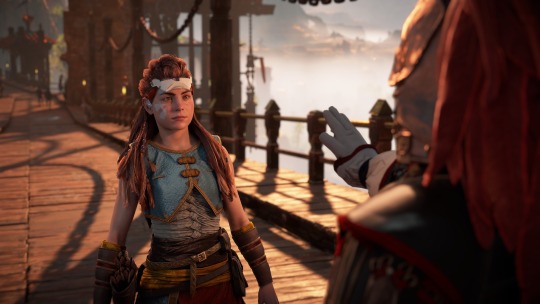
The disguise was no use anyway, there was a line of guards waiting at the city gates who stopped me immediately. They told me that Ersa had been murdered by Shadow Carja. Gera told me a little about them so I wasn't completely clueless. The Carja are in the midst of a civil war, and Erend has been promoted to captain of the vanguard in his sister's place. It's a shame. I would have liked to meet her.
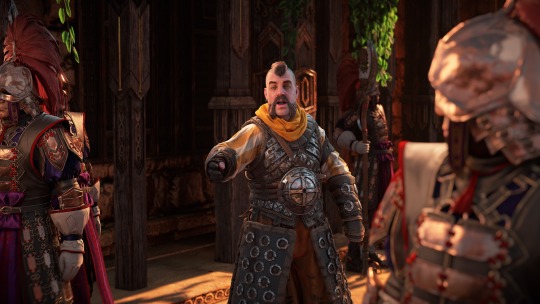
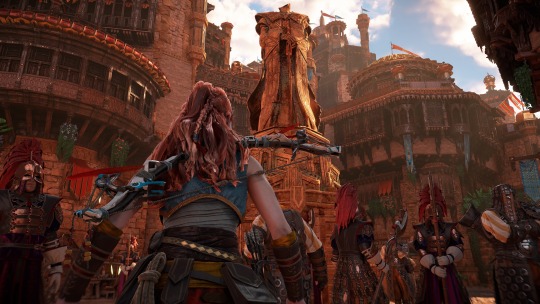
When I asked the guards to summon Erend, they might have turned me away there and then if Erend hadn't happened by himself, stone drunk. He agreed to let me search Olin's cabin, since he's out of the city on a delve. Did he hear about me? I guess he has no reason to believe I'm alive anyway.
Erend led me through the city, the entrance crowded with Carja and Oseram, heavily armoured. It was loud, stunk of spices and manure, crammed with the cries of sellers, but it was beautiful. So tall, felt like I was going to strain my neck taking in the turrets and domes and overhead walkways, blue flags and hanging ivy swept up in the breeze.
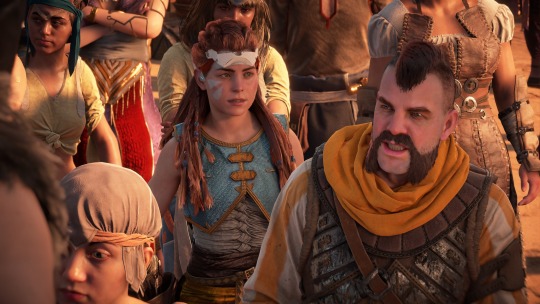
Erend wasn't too happy with the mob gathering in the city, demanding vengeance for Ersa's death. He cussed out the herald and they dispersed. I've heard people whispering of the new Sun King's supposed weakness when it comes to retribution before now, and it seems the sentiment is stronger here in the city.
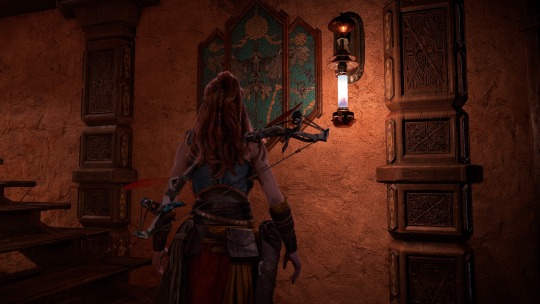
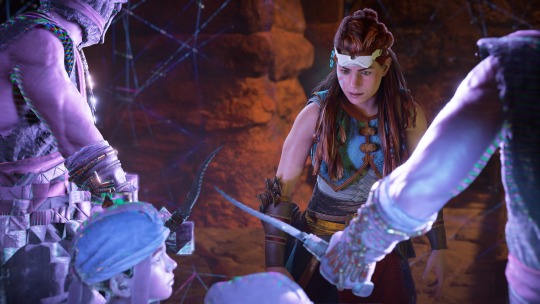
Searching Olin's apartment. It was huge, decorated with mosaics and embroidered drapings, lounges and beds and shelves full of trinkets. His treachery has made him wealthy. Breaking through a vault door to his hidden basement, I found a map and journal proving Olin was a traitor and that the killers were targeting me. I also found a message, the killers holding his wife and child hostage, urging him to obey. So he was coerced...it doesn't change anything.
I guess what befell the Nora was my fault, in a way. Olin just happened to be there, and he saw me. If I never went up and spoke to him...Where would I be? Would my boon for winning the Proving have been granted? I would never have seen that image of the short-haired woman, that's for sure, and would be forbidden from leaving the Sacred Lands to search for an antidote to the corruption barring me from the door in the mountain. None of this was worth the lives lost, of course, but maybe this was the only way I was ever going to find the answers I've been seeking all my life.
I found Olin's location among the evidence, but before I could leave Erend begged me to use the Focus to search the field where Ersa and her soldiers fell to the Shadow Carja. Maybe I shouldn't have told him about the Focus. Then again, he granted me access to the city and to Olin's house. I should return the favour.
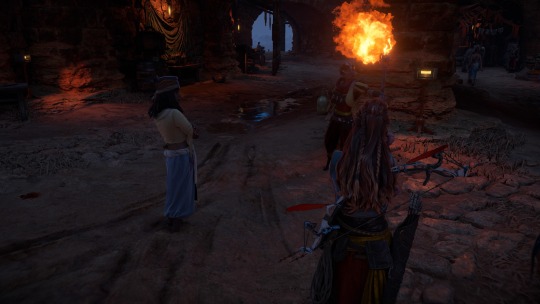
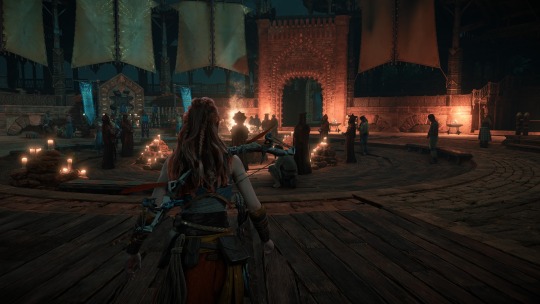
Meridian by night. Fire dancers, then I was attracted to a beautiful, mournful chorus and came upon an open rooftop, a pyre in the centre surrounded by singing sun priests. I wonder if Irid is here somewhere. There were many worshippers, and the altars around the circumference of the space each held artefacts and sigils of a different tribe. Shrines to commemorate those lost in the Red Raids.
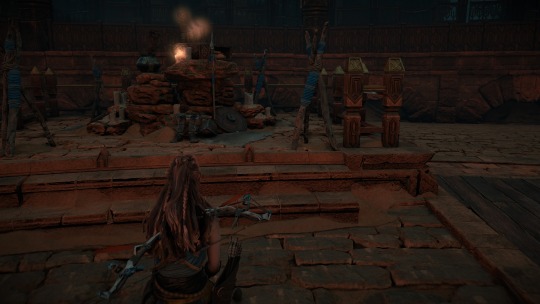
There were many at the Oseram shrine, many more at the Carja, a few Banuk. None prayed for the Nora. I sat there, not sure if you could call it praying. The weapons and armour of the dead were on display. I turned and saw one of the sun priests watching me from the edge of the chamber.
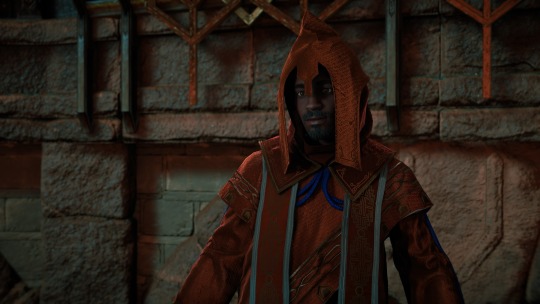
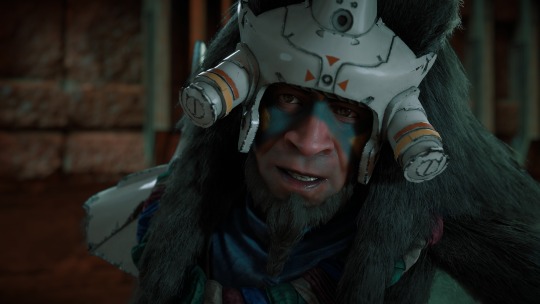
His name was Naman, and he was seeking help in clearing sites of worship for a Banuk and an Utaru (the first I've seen) who had come to mourn their own. I agreed to help. At first I didn't really understand the spectacle of it all. Such showy rituals do nothing for the dead. Naman said they're for the living, that they help us to represent the feeling of grief, give it form. Does that separate it from us, in a way? I remember the flowers and artefacts at Rost's grave, his feather cape slung over the headstone as if it was his own body, unyielding, carved with runes of life and memory. It's still in me though, the grief. Those were Nora rituals. What are mine?
I think I'm too practical for ritual anyway; too bitter for prayers.
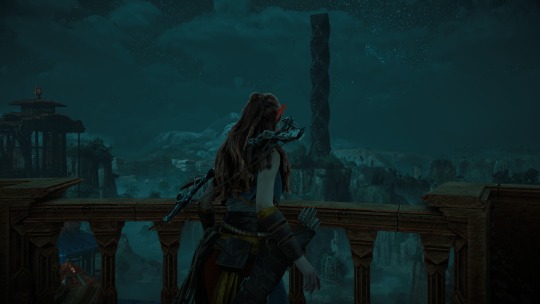
The spire. In the night, it's even clearer that it's machine made, the way it glimmers along trace faultlines.
Tired, but there's so much to see in this city. I'll stop by the Hunter's Lodge next. As much as I'd like to stay here on the empty outlook under the stars, I think the priests will kick me out soon enough.
#30 image limit my detested#aloysjournal#aloy sobeck#horizon zero dawn#hzd#hzd remastered#photomode#aloy
13 notes
·
View notes
Text


Class is an outdated attempt at socio-economically categorizing humans within the industrial society.
Marxists, especially the former Marxists, as well as all the Left tendencies inspired by Marxism, have relied on the same-old tripartite categorization of society dating back to Aristotle, now divided into three big classes. Contemporary sociologists of the Marxist schools of sociology will be using the stats of median income to show how they’re right about it; where indeed the «middle-class» exists and it’s been going down toward poverty levels in the last few decades, where the upper group of ultra-rich just kept getting wealthier and more powerful. All of it is true, yet only within a tiny, limited aspect of the mastodon. It shows us where most people are situated in terms of income, yet not saying much about all these people located elsewhere up or down the curve. That these people aren’t actually part of any unified class, within the tripartite model of “middle/proletarian”, “poor/lumpen”, or “rich”. In reality — or I mean closer to what could be the social reality — a median in statistics only best represents where a bell curve is located within a spectrum of linear-organized data.
Having lived through years of being on the workplace, in the streets, outside of academia, will reveal that the “world” is a much more complex and especially fluid, dynamic place; not made of categories and classes, but people. Especially groupings of people, constantly organizing and plotting for power. Either to gain more or maintain their “acquired rights”.
This narrow marxist interpretation also serves another purpose than showing the social inequalities capitalism creates. It is useful for hiding or overlooking the privilege-building or consolidation of these same groups of Left-oriented middle-class intelligentsia, or petty bourgeoisie commonly found backing Center-Left parties, NGOs, trade unions or more pervasively running a vast portion of the nonprofit sector, especially the sector more politically vocal about issues of social justice. They are struggling for their own elevation through the social ladder, in conflict with who they perceive – with a level of accuracy – as those limiting their access to higher positions of power.
Same goes for the «rich». As if you’d ask me, for instance, who is the richest person/family on the planet, that’s a question no one can definitely answer. Also an equally complex question : who are the « rich »? Not only wealth is a more complex notion than just net worth, but the super-wealthy do not only deal in monetary values... they’re also using other kinds of more «hard» assets and currencies like resources, precious metals, and now big data. The super-wealthy also tend to be super-connected people. Their wealth would not be very meaningful if this wasn’t a factor of power within social networks.
The question of their might makes it even more complicated when you look at their political schemes and networks. And even among this super-rich crowd, there are factions, milieus, gangs playing Monopoly with the world’s con-o-mies. Ever since Trump went into politics, for instance, this became clear there wasn’t only one power gang in the US, that the most repulsive of these, the White supremacist Christian ultra-conservatives, was engaged in an unprecedented battle against the neoliberal establishment, the dominant gang of the last few decades. This is even true in a totalitarian rule like China, who has different factions fighting within the Party, down to occasional vendettas, in order to consolidate power. Everywhere across capitalist societies there are smaller rich of the upper middle-class, all the way up to the mega-billionaires, with differing stakes in the industry, or gradients of political entry – and positions, from the progressive Left the Rothschild family and Soros to the ultra-conservative Far Right like Murdoch and the Koch.
Hence categorizing the “rich” is always more complicated than it seems. But to me, the ultra-rich aren’t as important as they used to be as social antagonists. I know they are doing terrible things, engaged in running awful schemes that keep billions of people into misery. And they are, in all appearance, holding the reins over governments, the media, NGOs you may work for, and most businesses you might work for.
However you might notice that your local progressive resources center for the homeless is managed by rather middle-class people. This is adequate, as here we are dealing with a charity service, notoriously structured by this same-old Christian binary relationship between haves mores and lesses, or between the higher-educated and the low-educated. The moment you’ll see a homeless resource center run by the homeless, well, that’ll no longer be charity, but rather autonomy. Yet social relations keep being structured into hierarchies between castes of different levels of privilege.
Society, being itself a wide-open pyramid scheme, is thus filled with a myriad of people involved in more or less filthy games that deprive others from having the same quality of life they enjoy. When it’s not about White nuclear families raveling in their comfy private bubbles on the countryside it’ll be urban hipsters keeping nice apartments for their artsy gangs of friends. You might even notice a level of disparities — and consolidation of privilege — within the milieus of the homeless, and the prisoners. But as usual, there’s a share of good economic motives behind all this privilege-building. In big cities targeted by intense gentrification, renters are better be organizing with friends, or building networks of friends, in order to share the rents between people they know so the rents remain as low as possible. That also gives the more radical-minded the possibility for conducting rent strikes on more large scales or do other kinds of anti-eviction or anti-hike campaigns that got more effects than just isolated renters filing formal complaints. Worker coops are a way for them to avoid « falling » in the streets by having decent self-managed jobs that may also contributed to accumulating social capital. As usual, collective organizing is a powerful flagship for gaining more power.
But then again, when more power is gained, what is done with it? When peer groups create their housing and workers’ coops, or even collectively-run squats wherever they still exist, what is the place left in their world, at the end of the day, to all the lesser-empowered outsiders? To those often ending up being — yet again — at the receiving ends of privilege-building social machinations. Being “socially-awkward”, being misfits or too “triggering” makes these seemingly more horizontal, democratic, collectivist schemes as yet again exclusive to those disabled, handicapped, aged, gendered, or just not enough socially-skilled for inclusion. Because, like in the rest of society, these projects are produced through in/out-crowd dynamics, generating social exclusion as byproduct. One way or another, it goes down to be facing locked doors, walls, fences, more sleeping on the sidewalks or at best navigating through precarious rents with deranged roommates… so therefore the social hierarchy of prisons is being maintained. Of course this has to do with landlords and « bosses » owning your life by the balls (e.g. a class relationship), but how do people also not reinforce this through caste dynamics? So even when these schemes are considered to be helpful or charitable, the separation they induce — here’s a place where these late Marxists known as the Situationists got it right) is still by essence, and functionally, alienating. However there is little doubt of the good that some of these people do, despite the alienating structures they’re working in.
How does a caste system works?
Essentially, with the reproduction of identitarian cults, clans or families, and more importantly their related cultures, that allows them to relate to each other. Culture — including cultural representations — is the tie that binds them; as cultures are being used as a means to reinforce the caste’s status quo, redefine its morals, and set the boundaries for inclusion/exclusion as well as serving other control imperatives. These aren’t patterns we observe through big social categories such as classes, that only defined by their mutual economic productive activity. The caste reproduces its own systems of representations and relations, beyond its mere socio-economic activity. The former actuates the other, and provides a kind of appeal, by hype, notoriety, prestige, edge, luxury or any other sort of added social value to it. A sense of privilege, without really providing with meaning.
I’ll be elaborating more on this in an upcoming text on countercultures and normalization, but in the Western rich urban hellholes we could have witnessed over the past years a movement from parts of the punk subcultures toward hipster, more streamlined upper castes of artsy citizenry. Mainstream fashion of the trendy urban lifestyles was reinvigorated by what used to be signifiers of marginal milieus... tattoos, piercings, punky black clothing and asymetric hairstyles, even dog-herding (that for some has been replaced with having children), are all now predictable, unsurprising elements of the urban environment, found in just about any of the world’s metropolis, even outside the Western world.
This has been a way to be part of the “in crowd”, to be accepted not not only into squats, but private rented spaces, get decent jobs at trendy hot spots, and more importantly, get relationships aplenty. That’ll be controversial to say about the same of the normalization of the “LGBTQ+” as social identities, that have played the same socio-economic roles and with the same ends, even tho by themselves they represent a fourre-tout of different minority gender identities and sexual preferences rallied together as one big category, for everyone under its banner to relate to regardless of its meaning for every one’s sensibility.
The idea is not to be criticizing any of these subcultures or their values, or even to be blaming urban trends for normalizing them, but to look into how caste dynamics are functioning, thanks in great parts to the use of cultural signifiers and their related politics. Also to realize how the individual, or the person as themself, is being kept silent and invisible by these caste politics, despite all the social media celebs, who’re really not standing for — and by — themselves but literally posing on a stage through a set of prefab representations. How if you aren’t identifying as one of the recognized identities, just choosing to identify as a “yourself”, or a “person”; this becomes a void for the social management of privilege and oppression. There are no non-gender pronouns for persons, only for lifeless objects, or groups to some extent.
This is — in my view — the deepest cause behind the epidemic of mass-killings we especially got in the US. While some of these are mostly based on demented ideologies of hate against more or less specific minority groups, many of the mass-killings are often committed by disenfranchised, misfit, socially-isolated males who for a reason or another, lacking a better analysis of what’s happening to them in this world, decide to stick it up to those they see as their most direct oppressors. Namely, the social castes in their environments. And in a way, it is true that crowd/mob dynamics tend to make human groupings in general to become more oppressive while losing self-awareness as their numbers increase in a given context.
If the Left would be truly understanding the dynamics of social exclusion, oppression and privilege, how do they work, perhaps they could be helping to some level against such sprees of murderous violence that only now benefits more despotic police controls of the public place. But the Left has remained stucked, as some anarchist critiques know, in this endless spiral of outdated analysis of social and political dynamics, centered on our well-known cartoonish representations produced by Marxists. Castes are defined by a lot more than just the productive activity of their members, and equally the socio-cultural reproduction that defines them goes beyond their mere socio-economic productive roles, when they got one in common, even if we consider society as meta-factory.
The issue of how Leftists could make it better, with a better analysis is beyond me. More so, it ain’t really my own interest. Still, I find it harder to not be caring about the mass-shootings, and in fact the « not in my lawn » approach to social problems might not so easily apply here, as anyone could potentially be affected by these sudden bursts of extreme interpersonal violence.
The purpose of such a perspective on social relations around us is to not be fooled by deluded beliefs in the radicality of our « projects » or initiatives, and to look at those with a more critically realistic lens that shows their shortcomings and weaknesses, standing in the way of the total anarchy or the social revolution you might be after. As to be reproducing caste relations can intrinsically undermine any initiative aimed at equity, autonomy or free association.
As I said too often, anarchists and nihilists have a specific opportunity — often wasted — of creating a social tabula rasa, that negates both the dynamics of privilege-building by putting the deeper issues of property and capital-building into question, while also, through patterns of free-based relations, to be making the issue of «social progress», pushed for decades by the Left, to become irrelevant.
Like there’s no need for work within the industry if we choose to liberate goods instead and creating a commons around everything, where everyone can enjoy shit without the trappings and hindrances of both bureaucracy and property, from being on welfare to «buying land», we’re still being submitted and deprived from an immediate relationship with the natural world. There’s no need for affordable housing if you find a way to occupy spaces for living, and especially shared living. There’s no need for better working conditions if you abolished the need for money — in the first place — in order to have good living conditions, as especially to be able... to just make friends, lovers, accomplices or just have a good conversation with some other human, regardless where they’re from. There’s no need for these demoralizing homeless shelters if you got organized squats where everyone has at least their shot at a living-together, and from which other occupation projects may arise.
The power of negation, is one not being asserted by the liberal agency. Neither the one of supposed « radicals ». Or this false negation will be held contained within their own communal bubbles, yet never outwardly-asserted. And in fact, the Marxists have an historical tendency at postponing negation, as revolution is an evolutionary process where, first, we must build the conditions for the proles to be able to negate the State and capital... as if they had found the secret to immortality!
Therefore, like with the rest of the liberal bourgeoisie, breaking the law, seeking pleasures against the dominant morals, will be reserved for the private space, of the caste, the communal in-crowd, or the family, or on a private island. And the more harmful immoralisms (such as rape, abuse and other violences) might also break loose due to the safety bubble promised by privatized spaces, in milieus where they hardly would be allowed to happen in broad daylight.
But are these really negation, or just reconstruction of same-old patterns of appropriation and exploitation, inherited from the dominant morals? A transgression ain’t necessarily negation of an order but rather its preset contradiction, as “rules are meant to be broken”. The “anti-” principle is not an “a-” principle, or abscence of principle; it is an against not a without. Satan exists because of God. So the bank robber or cryptominer is still after making big money, only innovating in their fulfillment of the well-known capitalist imperative (unless of course they throw the money in the streets). I ain’t saying it is wrong... only that it is not negation of an order and its values, where the person takes the liberty to make their own of the latter, asserts power over their own world, making themself emperor and god over it.
Absolute negation of all orders — the questioning of everything — is what is necessary to revert the power of the totality over ourselves. Therefore we cannot truly avoid or abolish these caste relations that separate us both from each other and from ourselves — as well as the world around us — without putting their imperatives, values under the crushing mill of the cold, concrete logic of total negation.
Property is not only theft. Fundamentally “property” is just not something that exists. Your comfort zone known as your household, or friend’s commune, or mansion on top of the hill... are only a privatized space made-up by capitalism’s territorializations and reinforced by walls, doors and locks. It is only «real» as far as it is a relational construct, enforced by the threat of judicial or interpersonal violence. You cannot pretend anarchism, even less «communism» while at the same time enjoying these levels of privilege provided to you by an invisible, unavowed caste system. Well you can... of course! But that is more of the same-old Victorian hypocrisy, reinforced by equally Victorian-era ideologies pretending to oppose the dominant system. You may choose to be a conservative so to be less an hypocrite — indeed — yet the status quo of the caste system will be maintained, only more bare. My postulate, that is not so important to consider, is that 19th century classical liberalism has kept Western civilization from being a full-fledged official caste system, or at least this was delayed by a century of class-defined struggles.
Regardless. The wild, the feral, the natural domain does not know these territorializations. Or neither cares about if they know. The wild one only cares about their own sustenance, protection, pleasure and well-being. Anything else, any attempt at accommodating with any level or sphere within the caste system, means becoming more civilized, or over-civilized, as these are the mostly-intangible yet highly-recognizable walls of civilization, defined by culture above politics and economics. A vagabond can keep freeloading luxury hotels or chic cafés, in order to partly avoid the misery related to homelessness, or even hang out at student parties or exec clubs, but what will chase him off from these spheres will not be their bank account, official status or even their political allegiances; it will be their external appearance, their tenure, their speech and etiquette.. or lack thereof. As the cultural standards are what makes these social categories to be castes. Not classes. Because, to repeat, castes are culturally-defined — more than socio-economically defined — groupings.
So I am not here posturing for an anticiv purity by rejecting caste relations; but this could be useful as an ideal for a direction. Or giving rationale and analysis to a life where the radical critical thought makes you a social misfit, anyways. It can be interesting to be social hacking across the cultural layers of this garbage every caste uses to reinforce themselves, and many of us do achieve this, to different levels of effectiveness. But then again, will be driven by a will that is your own, or only reflect the desires mass-produced for the masses to follow? As for every caste there are different means and modes to attain what everyone in this society is after.
Doesn’t the wild one only contents in seeking power over their own existence? Why, otherwise, would they be seeking any larger power, if not for chasing the aims defined by the dominant power dynamics? For having the privileges they envy so much from any of the castes above them, or for « ruling in Hell, instead of serving in Paradise »?
Perhaps because such dynamics as the terrorism of the judicial system are hindering on this self-power. That the goal would not be to become yet another layer of judicial system, like the call-out culture appears to be doing.
There lies the importance of the initial thesis of this tension. That the Marxist and Marxist-leaning tendencies of the Left have been from the start adopting the class struggle analysis in a way as to brute-force the emancipation of people only through their own hierarchical systems. This is why they’ll always be confined, mentally-restrained, to the notion that any self-empowerment, self-defense, and liberation can only be attained through mass social avenues and means; as these reflect, more deeply, the need for empowerment of a more or less specific caste of «intelligent» educated middle-class people, over what they’ll always perceive as a mass of people who are in the dark, who need saviors or organizers or hot-blooded, loud-talking revolutionary leaders to pull them out of their politically-induced trance.
Not to say this was the case of enlightened, fearless rebels like Fred Hampton, Geronimo, Novatore or Harriet Tubman. These were in my opinion more like the feral ones that undermined the consolidated powers of their times, the society subjected to a predominant caste. Needless to say… you’ll also notice they were also not our well-known arrogant, power-hungry White college kids from the suburban middle-classes.
So the Marxists need this vague, Cartesian model for a social category — the class — that is inherently defined by a position within the production chain of Industrial Society. As in their view, one cannot be else than a Worker, or a Prole (and perhaps including the lumpen prole) in order to take part in this class struggle toward the liberation of all the Workers. But are these leaders, or organizers, ever been really the Workers they claim to be leading to liberation? Aren’t they instead positing for their own empowerment over the Workers, by the use of these Workers workforce to push for a change of power dynamics, where this intelligentsia caste attain a higher privileged status within the processes of production? In the neoliberal society the best they’ll do is to have well-paid white collar positions, perhaps even an entry into state politics within a minority party. Which doesn’t discount for the sleazy corruption of the lawyers and real-estate profiteers taking higher positions of power within the dominant parties. But, restating the obvious that I said earlier, they’re all chasing the same sausage, only through slightly different means and modes. And think about... if they’d, once again, come to terms with the whole capitalist state like the Soviets did, they’d have the highest positions in society!
So you are anticapitalist? Great. But “anticapitalist”, just like “antifa”, is a negative position, which doesn’t say much as the kind of world you want in the place of the existent order. What does it means to you in daily life, beyond a few protests and graffiti?
You are maybe communist? Super. And given it is still subversive thing in many parts of the Western world, this gives you a little of rebellious edge. But then again, whose communism? If you are only after the Commune then which commune are we talking about? The Communal form of property Marx himself told us about, that the Ancient Greeks invented, those brutally partiarchic, slave-owning landlords, who weren’t that different, actually from the Founding Fathers? The Commune of Friends, where all you need is to become a “Friend” in order to be included and treated as equal? So what is it you call a Friend, then?
My intent here is not to drag everyone in the mud of their own grandiose projects or claims (no matter how I’d love to!) but to be looking into what people are really after, and for whose specific interest. As, like a Stirner would say, as far as the Commune is not my own, or as long it is not knocking at my door for any friendly motives, it is strange to myself; it means nothing to me, as it is only to the benefit of a specific group of others.
Not only it is not so much benefiting to me, but a very vague mass of «proles», comrades or Friends that I may or may not be part of, depending on the analysis of the leading core group in charge of defining the social categories and their narratives (also known as the “ID politicians”). And only my being included as a proletarian comrade I may benefit from the leftovers of this nomenklatura. I do eat the leftovers of proles on a regular basis, as part of my means of survival and for secondary ecological aims, but it is never as retribution for serving under the wing of this social category.
The world is driven not by money, but by narratives and their representations.
There were times where men couldn’t live without God. Or without a hunt. Or without fire. Equally, a « world run by money » is a capitalist, materialist narrative of the late industrial age. Such narrative, just like any other, becomes existent due to its supportive system of power relations. Yet it won’t necessarily be meaningful… most often it won’t. If you let yourself be defined and driven by these, written and drawn by a group of others, you let yourself, again and again, be fooled and controlled by the group(s) enforcing it, then it will become an unavoidable fact of existence. Hence this group de facto becomes a caste above you... the hierarchs owning all the secrets of your forever-delayed liberation. Accepting them to define me is accepting the hinges of their control over me.
And let’s make it clear to some of my potential detractors, that the Marxist Left here was used only as example among many other iterations. The Far Right or Alt Right, as we could witness over the past few years, tends to be more successful these days at their games of gaining domination over yet another mass of (much) less educated/intelligent peoples for their own caste benefit. They are, after all, connected to specific groups — the old White supremacist aspect of the wealthy establishment — fighting to regain the power they apparently lost through the Post-War, and especially post-Civil Rights Era neoliberal order. Instead of the class, they’ll be using the more retrograde social categories of race and/or national identity. These were, after all, the first identity politics of the Modern world, in the republican, industrial, post-religious world where scientism and Nation-States purportedly replaced the old religious ideologies. The retrograde Alt Right, more classic liberal than actually conservative (and much less « libertarian »), equally got their own priests and popes of social justice, pandering on inherently shallow, brutish definitions of the «human» as if due to being older, or before, they were any more accurate or righteous than the recent «corruption» of the LGBTQ+, the Women and the non-White social identities, undermining their former, ages-old domi-nation over bodies. Are these new categories produced by the new Left and reproduced by the social media empires – led by White normative men, by the way — any more authentic or accurate? I doubt that.
The only social identity that is accurate, is yours, or mine. The question that you may represent, not the prêt-à-porter answer. That is the only one, removed from even the official citizen and corporate definition enforced by the state from shortly after your birth as physical living being- that can define you.
Who are you? Or what are you?
Am I, the author, in a position to know better than you? I only know, for sure, that you may not be what you pretend, but something more, or less, or else. You may even possibly exist!
#desi#desiblr#capitalism#castes#class struggle#hierarchies#inequality#Marxism#privilege#society#fauvenoir#human pyramids#class war#class politics#classism#anarchism#revolution#climate crisis#ecology#climate change#resistance#community building#practical anarchy#practical anarchism#anarchist society#practical#daily posts#communism#anti capitalist#anti capitalism
9 notes
·
View notes
Note
What attracts/turns Twice's Sana on the most in a person? Like physically and in personality

OK first this was a fun reading to do the energy was Immaculate Aphrodite he had a lot of fun with this. Second I love this woman she's definitely one of the Kpop Idols where it's like if she wasn't an idol or if I somehow managed to meet her we would definitely be in simbasti's. Baseball who just The Vibes alone but also I'm a curious bitch so I definitely done a reading and we legit would just be instant besties.
And again disclaimer warning grain of salt with all of these readings I'm probably not going to keep doing this every time but like for the first like couple ones I will.
✨What Turns Sana of TWICE On? (The Aphrodite Files)✨
So... someone asked me what kind of person really makes Sana’s heart (and maybe her thighs) flutter. You know I had to call in my girls Aphrodite, the stars, and my playlist.
First song to pop up? I Like It – Stray Kids.
Yeah. She "likes it". She just has very specific taste. But she definitely enjoys the chase I feel like the lyrics specifically , " Cops and robbers, Chase each other, full of energy. Pushing me further, pulling me closer, some sort of chemistry."
Let’s get into it:
Astro Pulse:
Sol (Sun) → Confidence is hot. Shine on. She wants a main character energy.
Neptune → Dreamy, artsy types with soul-deep mystery? Yes please.
Gemini → Talk to her. Flirt with her. Make her laugh and think at the same time.
Oracle of Roses Energy:
Sana is lowkey (highkey) obsessed with complex types. She’s into:
The Ruler — someone in control, commanding the room.
The Gambler — bold risks = bold attraction.
The Priest — spiritually grounded, but mysterious? Instant intrigue.
The Seeker — curious minds are a turn-on.
The Innovator — creative, different, "not like other boys" ( it's also giving androgynous he can be both a hot guy and a pretty girl type of lives.)
The Outsider — oh, the brooding misfit trope? Say less.
The Warrior — someone protective with bite? Yes, sir.
Tarot Thirst Breakdown:
10 of Wands + 4 of Pentacles → someone who carries the weight of the world but doesn’t complain. She wants the stoic type hiding softness underneath.
Knight of Cups + Queen of Pentacles → romance with stability. A poetic heart in a grounded body.
The Lovers + Justice→ intense connection + emotional accountability = Sana’s idea of soulmate stuff.
Ace of Pentacles (rev.) + Emperor (rev.) → she’s not into controlling types or someone with no direction. "Get your bag, know your worth, or get out."
Three of Wands + Two of Cups→ partnership with growth. She wants a future, not just a fling.
Six of Swords → she’s attracted to people who’ve been through it but healed. Emotionally stable and mature yes please.
Queen of Wands → match her energy or get scorched.
Sana’s ideal type? A soft-eyed rebel with ambition. Think creative + mysterious + emotionally evolved, with killer banter and boss energy. Looks? Warm-toned, confident, sexy without trying. Vibes? Dreamy but grounded, protective but not possessive. If you're serving main character with an edge and a heart? She’s probably already thinking about kissing you under moonlight.
Bonus in terms of physical appearance she finds vv attractive:
Sana’s Visual Type (aka the Aesthetic She Can’t Resist):
Golden Glow & Effortless Heat:
With the Sun card and Queen of Wands energy, Sana is drawn to people who radiate warmth think sun-kissed skin, tousled hair, that “I woke up like this” charisma. Confident without trying too hard.
Think soft gold chains, cozy oversized sweaters over toned frames, sunlit selfies, tousled hair like they just left a rooftop party in Paris.
Dreamy Edges with a Bite
Neptune + The Outsider + The Warrior = she’s into artsy bad boys/girls who look like they sketch poetry on napkins but could also wreck someone’s day in a fight. Quiet storm energy.
Piercings, layered silver rings, mysterious eyes, faded denim, black boots, and chipped nail polish—yes, gender-neutral hotness is real.
Rebel in Soft Fabrics:
The Gambler and Innovator, Sana likes people who dress with intention and just enough chaos. They mix boldness with cozy familiarity like a cashmere sweater over tattooed skin.
A soft streetwear/indie fashion hybrid—slouchy beanies, statement jackets, expensive-looking but undone.
Romantic Vintage Royalty
The Priest + The Seeker + Justice:
It gives old soul energy. Sana is turned on by a slightly vintage, poetic, timeless look someone who looks like they stepped out of an arthouse film very royalty coded like herself.
Linen shirts, rings with stories behind them, old cologne, bookshop energy, handwritten letters, neutral earth tones.
Duality Chic:
With Gemini + The Lovers + Knight of Cups, she’s all about duality cute and spicy, soft and dominant, goofy and seductive. She loves when someone’s look flips from comfy date night to red carpet heartbreaker.
Messy hair with tailored blazers. Soft lips with sharp jawlines. That one person who looks cozy at brunch but deadly at midnight.
Sana’s aesthetic type?
Warm, magnetic, and a little dangerous. Someone who looks like they smell like sandalwood and dreams, holds eye contact like a slow song, and wears heartbreak like designer perfume.
If you’re dripping in mystery, softness, and power congrats! She’s already mentally writing fanfics about you two.
#SanaTwice#KpopAstroVibes#AphroditeTea#WhatSheWants#thirst tarot#dream girls secrets#tarot & tea#dreamweverz#tarot
6 notes
·
View notes
Text
I feel that it's time to start having real discussions about concepts such as karma. I see many people speak on it without truly understanding the function it serves.
Karma is not an emotional concept, it is the fabric of reality; The momentum we cultivate within our lives & the actions we choose to take in response to the natural occurrences in the circumstances that make up our lives. Take into example the wheel of fortune tarot card. We cannot control other people, but we can control ourselves. Karma can and will overlook those who are kind, meek, & good hearted if they cannot or will not fiercely defend themselves from the likes of the imbalances that plagues humanity. You are not special by default. I don't say that to be cruel, but to be honest. You are special because you choose yourself, because you continue to push in spite of it all. Take your destiny into your own hands, do not be a sitting duck; because inaction is an action as well. Karma is on no one's side inherently, all it does is maintain the necessary balance for existence to continue unfolding. If you learn how to work the system of Karma it can allow you to cultivate the life you desire. Karma favors few, and even when you are favored it does not mean you are impenetrable. We must remember that our perception is a key point in our earthly and ephemeral experiences. Which is why momentum is so important in the conversation of karma. Karma is not necessarily going to naturally pave the path to your fortune or another's misfortune. Especially if you take no intentional actions towards your goal, or if you do not take necessary action. Or even if you misunderstand a lesson and lash out at the person you perceive to have harmed you. Karma is simple yet complex- and to view this system through such a human lens is not doing us any favors. It is a law of the universe, every action has an equal and opposite reaction. Yes, karma can "defend us" but most frequently the case is that you or another person have spirits that rock with you. we must kill the emotional narrative. Justice is an aspect of karma, yes, but you also at some point must realize that we all have free will. Was slavery justified? Then how could karma allow this to happen? Is the Palestinian genocide justified? Then how could karma allow this to happen? Have you ever watched someone be forced to relive a karmic lesson over and over again? Yet they remain delusional & continue on the cycle while still managing to manipulate and sway others into their favor? Almost as if nothing changes and they are still allowed to cause harm and chaos? There are many factors to take into consideration. One factor being, have you taken the necessary action to hold someone else accountable? Have you done your due diligence to reflect on the situation or circumstance that occured and asked yourself what can be learned from that experience? Is this person, individual, etc a reflection of collective energies and are they serving a higher purpose that you may not be aware of? All that is divine is not inherently good. What makes you think that an abuser is going to be aware that they're getting their shit rocked because they suck as a person? Who's to even say someone will suffer in the same lifetime as an instance of "unjust" action upon another? We all have free will. No one is coming to save you. Take action and save yourself, you are the hero of your own story. Utilizing spiritual jargon such as karma to put yourself on a pedestal is silly. You are the karma. Society is the karma. Existence is the karma. We are all the result of an action, our life circumstances, the state of the world & society at large. What role will you play?
13 notes
·
View notes
Text
Divide, Destroy, Abandon: The British Blueprint Behind Myanmar’s Civil War
Here is the entire essay again with every instance of — removed and replaced with proper punctuation or sentence structure:
Every major problem in Myanmar today, including ethnic conflict, civil war, military dictatorship, economic underdevelopment, and religious violence, is rooted in the way Britain invaded, divided, and ruled the country. British colonialism did not just extract wealth. It reengineered Burmese society to serve empire. It turned communities against each other. It broke existing systems of governance. It forced foreign borders onto people who had never been one country. And when it finally left, it handed power to a military trained in violence, not democracy. Myanmar was not chaotic before Britain came. It was made chaotic by the way Britain destroyed it, looted it, and walked away.
Before the British invasion, Burma was a unified kingdom with a functioning administration, strong Buddhist traditions, and a literate population. It had trade routes across Asia, a complex society with its own justice system, and independent relations with China, Siam, and India. In the 1800s, the British Empire wanted control of this region for two reasons: trade and military advantage. So they launched three separate wars over sixty years in 1824, 1852, and 1885. They killed thousands and finally annexed the entire country into British India.
Once Burma was colonized, the British destroyed its monarchy, dismantled its administrative structures, and exiled its king. They tore down the local institutions that had kept order and replaced them with an occupation army. British officers were imported. Indian administrators were brought in to run the country. Burmese were cut off from power. The entire economy was reorganized to extract resources such as rice, timber, oil, and gems. Britain did not invest in development. It built infrastructure only to extract wealth. Roads and railways went from plantations to ports. The profits went to London and Calcutta. Burmese peasants were left landless and in debt.
The British did not govern through unity. They ruled through division. They split the country into Ministerial Burma and Frontier Areas. The heartland, where the Burman majority lived, was ruled directly. The hills and highlands, where ethnic minorities like the Karen, Kachin, Chin, and Shan lived, were governed separately through British-appointed tribal leaders and missionaries. This created two systems, one for Burmans and one for minorities. It stopped communication between them. It built resentment and isolation. And it laid the foundation for decades of ethnic conflict after independence.
The British also brought in hundreds of thousands of Indian workers and merchants to do the labor and run the economy. Indian moneylenders controlled credit. Indian clerks ran the bureaucracy. Indian police enforced colonial law. In cities like Rangoon, Indians outnumbered Burmese. The colonial government encouraged this. It used racial hierarchies to keep people divided. It treated Burmans as backward Buddhists, Indians as the middle class, and hill tribes as useful warriors. This was deliberate. Divide and rule was not a slogan. It was policy. And it worked.
During World War II, Britain abandoned Burma. The Japanese invaded. Many Burmese saw this as a chance to overthrow colonial rule. Nationalist leaders like Aung San allied with the Japanese and built a military force. Later they switched sides again and helped the British push Japan out. But the damage was done. Entire villages had been bombed. Ethnic militias had been armed. The British had recruited minorities like the Karen to fight against Burmans. Communal massacres happened during the war. These wounds never healed. And the British made no effort to heal them.
When Britain left in 1948, it handed power to a government with no real democratic experience in a country fractured along lines that the British had drawn. There was no strong state. No history of federalism. No trust between groups. No shared vision. Just a fragile ceasefire between factions, a destroyed economy, and an army that saw itself as the only force capable of holding the country together.
Aung San was assassinated before independence. His death created a power vacuum that the military quickly filled. Civil war broke out almost immediately. Ethnic minorities demanded autonomy. Communist rebels took up arms. The military began to grow. It seized more power. It suspended the constitution. It justified dictatorship in the name of unity, a problem Britain had created. The Tatmadaw, Myanmar's army, was modeled on colonial violence. It burned villages. It carried out massacres. It arrested and tortured civilians. These are not new behaviors. They are colonial habits.
The military has always used ethnic conflict to stay in power. It blames minorities for instability. It uses war to justify its budget. It stages fake ceasefires then breaks them. It does what the British taught it to do: control by division, rule by fear. The 1962 coup was not a betrayal of democracy. It was the final stage of a system Britain had built. One where guns, not votes, decide power.
The Rohingya crisis is also rooted in British rule. During colonial times, the British encouraged migration of Bengali Muslims into Arakan, now Rakhine State, to grow rice and work the land. The local Buddhist population resented this. Britain did nothing to integrate them. During World War II, the British armed the Rohingya to fight the Japanese and their Buddhist collaborators. After the war, the British promised the Rohingya autonomy then abandoned them. After independence, they were treated as foreign. The 1982 citizenship law excluded them. The state now calls them illegal. The military uses them as scapegoats. This problem was manufactured by empire then left to rot.
Myanmar's economic underdevelopment is not because it is naturally poor. It is because its economy was never designed to serve its people. It was designed to feed the British Empire. After independence, there was no industrial base. No land reform. No capital. Only plantations, debt, and foreign monopolies. British banks had taken the wealth. Burmese farmers had only poverty.
Even today, Myanmar's currency, land system, trade laws, and legal codes still carry the marks of colonial policy. The railway system still follows the extractive routes. The military budget is still inflated to control regions that were once divided by the British. The education system still privileges rote learning over critical thinking. The border conflicts are still based on the artificial lines drawn by British cartographers.
Every explosion of violence, every coup, every uprising, they are all echoes of the structure Britain left behind. The West still supports the army when it suits its interests. British arms companies sell weapons to Myanmar. Former colonial officers return as consultants. Sanctions come and go depending on who wins elections. But no reparations come. No apologies come. No justice comes.
The crisis in Myanmar is not an internal failure. It is the result of foreign invasion, racist empire, and strategic abandonment. The British did not just steal wealth. They shattered the possibility of unity. They left behind a country made to break. And it has been breaking ever since. Every death, every displacement, every dictatorship that followed is a page in the same colonial story. A story written in blood and silence. A story that must be remembered for what it is. Not tragedy. Not misfortune. But calculated destruction.
#myanmar#burma#burmacivilwar#mission of burma#burmaarmy#communist manifesto#american politics#usa politics#the communist manifesto#trumphater#marxism#communist theory#fudgepacker#communist party#idiots#socialism#anarcho communist#anti communism#anarcho communism#politics#socialist politics#socialist party#socialista#socialist revolution#hamas#communism#palestinians#socialist modernism#leftism#anticapitalism
2 notes
·
View notes
Text
planet of the apes (trilogy + kingdom)
spoilers ahead for the whole planet of the apes trilogy and kingdom of the planet of the apes
i have a very faint memory about these movies from when i was younger, i mean its a very popular series, who wouldnt be intrigued by the concept of talking apes (also the visual effects for these r genuinely very impressive) but what i don't remember is how surprisingly nuanced the conflicts in the movies feel
when watching these movies as someone much older, with the context of everything currently happening and everything that has happened, it puts the conflict between the apes-humans into a very real life context. caesar is such a wonderful, interesting and honestly deeply complex character, the trilogy works incredibly well as a whole and while some of the movies r much much better than others, his upbringing, trauma and overall experiences play such a role in what we see him do and say in these movies. what makes caesars experience so unique, is his proximity to his oppressors (humans). he has undoubtedly seen the ugly side to them, but on the other hand, he was literally raised by a human. who he undoubtedly holds so much love for and at the same time understands the ways in which as a collective humans have been bad to his people.
that's also why koba, who has seen the most grotesque side of human nature, and in a sense these experiences have radicalized him, will always haunt caesar. because of koba's experiences, one could say his ideology is more focused and clearer than caesars, who is grappling with it continuously throughout the trilogy bc of his attitude twds humans (and this gets brought up repeatedly throughout the trilogy) koba isn't even wrong in his frustrations, would the humans have attacked first? maybe, if the humans had a leader who was much like caesar, the conflict wouldn't have escalated to a point we saw in war. but again who could say for sure. im looking back on what i wrote so far and ive realized how much harder it is to talk about the original trilogy! Dawn is the best of the trilogy for this reason, the escalation of the conflict is dense and you could analyze it through a political lens and compare it to real life events... but i don't think i have enough political insight to serve it justice.
people have analyzed War (which is think is kinda easier to analyze than Dawn) like theres a clear parallel with american nationalism and how horrific and damaging that is to the oppressed (like they put the apes in literal camps) and also they had a strong strong desire to rid of anyone who held mutated virus, you could pull the pandemic parallel sure but this is also how an unfortunate huge chunk of the world feels about disabled people (the idea that ppl need to rid them so they don't infiltrate the gene pool or something like that). and just like in real life you have the humans outside of the camps who are opposed to the ideology of woody harellson and his men.
but anyways throughout all of this CAESAR grows and learns, and as a leader he guides his kind to freedom, their path to liberation is rough but it is well understood that his leadership was incredibly inspiring. it is no surprise that people live by his word, generations after he passed, to the point where they misconstrue his message
kingdom planted a lot, and i mean a LOT of interesting seeds. caesar being a religious figure of sorts, and noa, who you could call a skeptic for most of the movie, are great inclusions to continue the saga. a lot of very important questions get asked (not literally, but this is what i gathered)
caesars words guided their kind back then, how suitable are they for everyone generations later? (especially since they just have word of mouth to go off of)
the humans want to 'reclaim what they once had', what lengths are they willing to go for that and is it justified?
IS IT POSSIBLE FOR HUMANS AND APES TO LIVE SIDE BY SIDE? the most important question of them all. and it will be a very difficult one to tackle! has it been long enough that apes will 'forgive' humans? will humans just want to consume and reclaim without consideration for the apes? how nuanced r the viewpoints within the humans and apes?
DO YOU SEE HOW MUCH THERE IS HERE. the messaging is so so so dense and even though it is just an ape movie it is really fascinating to see how all of this plays out! i am so incredibly excited for the sequels to kingdom. would love anyone to jump in on the conversation, correct me or otherwise it is just a lot! i love this series!
#rise of the planet of the apes#war for the planet of the apes#kingdom of the planet of the apes#sensmovies#planet of the apes
7 notes
·
View notes
Text
Who's the Better Real Estate Agent: Glinda or Elphaba?
When considering the traits that make someone successful in real estate, a mix of charisma, integrity, resilience, and a deep understanding of people’s needs is essential. Let’s have a little fun by comparing two iconic characters from Wicked: Glinda, the good witch, and Elphaba, the misunderstood yet powerful "wicked" witch. If these two magical characters stepped into the competitive world of real estate, who would come out on top? Let’s dive into their strengths and challenges, evaluating them based on key real estate agent traits.
Charisma and Approachability
One of the first characteristics that can make or break a real estate agent is their charisma. This is where Glinda shines. Known for her bubbly, friendly personality, she has a magnetic charm that draws people in. Glinda’s optimism and approachable demeanor would undoubtedly help her in a career that thrives on building relationships and trust with clients. She would be the type of agent who could walk into a room and instantly connect with a potential buyer, making them feel comfortable and confident in her abilities.
In contrast, Elphaba isn’t necessarily known for her charm or approachability. Her strong personality and unique appearance have often made others wary of her. However, those who take the time to get to know Elphaba discover a deeply loyal and compassionate individual. While Elphaba might not win over clients instantly, she could attract clients looking for an agent who is authentic and deeply committed to their needs, even if it means being more serious and less focused on appearances.
Winner: Glinda In terms of initial approachability and social charm, Glinda would likely excel in winning over clients quickly, a key aspect of real estate.
Integrity and Honesty
Real estate agents must be trustworthy. Clients are making one of the biggest financial decisions of their lives, so they need to know their agent has their best interests at heart. Elphaba’s strong sense of justice and commitment to doing the right thing, even when it’s difficult, gives her an edge here. She has always stood up for what she believes in, even when it wasn’t popular or easy. Elphaba would be the type of agent who is straightforward with her clients, never sugarcoating the truth, and ensuring they have all the information they need to make informed decisions.
On the other hand, while Glinda is well-intentioned, she’s more likely to bend the truth to maintain appearances or avoid difficult conversations. Glinda’s priority is often to keep things light and happy, which might lead to withholding certain realities that clients need to hear. While she’s not deceitful, her tendency to prioritize popularity and ease might compromise the level of transparency needed in real estate.
Winner: Elphaba In terms of integrity, Elphaba's dedication to honesty and doing what’s right would make her a more trustworthy agent.
Resilience and Problem-Solving
Real estate is full of unexpected challenges: deals fall through, inspections reveal surprises, and clients’ needs evolve. Resilience and problem-solving are critical in navigating these hurdles, and this is where Elphaba excels. Throughout Wicked, Elphaba faces numerous setbacks and betrayals, yet she always pushes forward with determination. Her resourcefulness and ability to think critically would serve her well in resolving complex real estate issues. If an unexpected problem arose, Elphaba wouldn’t be fazed—she’d roll up her sleeves and work through it, ensuring her clients felt supported and confident.
Glinda, while positive and upbeat, has shown less grit when faced with adversity. She tends to avoid conflict and may not handle high-stress situations with the same level of poise. In a competitive market or during a tough negotiation, Glinda might struggle to navigate the complexities and could be more likely to look for easy solutions, even if they’re not the best ones for her clients.
Winner: Elphaba When it comes to resilience and problem-solving, Elphaba’s strength and determination would make her a more reliable agent in challenging situations.
Marketing and Social Skills
Glinda’s flair for attention and her social media-worthy persona would likely shine in real estate marketing. She understands the importance of image and presentation, which could translate into eye-catching listings and persuasive social media campaigns. Glinda’s ability to attract attention and create excitement around a property would be a huge asset in today’s market, where digital presence is key.
While Elphaba might not be as flashy, she would excel in niche markets that appreciate authenticity and a personal touch. Elphaba would likely create deep relationships with a smaller client base, focusing more on referrals and word-of-mouth, while Glinda would attract the masses with her broad appeal.
Winner: Glinda In terms of marketing and social appeal, Glinda’s outgoing nature and eye for presentation would likely attract a larger audience.
The Verdict: Who Makes the Better Real Estate Agent?
Both Glinda and Elphaba bring unique strengths to the table, but ultimately, it depends on the client’s needs. Glinda’s charm and marketing prowess would make her an excellent agent for those who value charisma and a quick connection. However, for clients who prioritize honesty, resilience, and someone who will fight hard for them, Elphaba’s integrity and determination would make her the better choice.
If we had to pick one overall winner, Elphaba might take the lead for her commitment to truth and problem-solving abilities. But in the magical world of real estate, there’s room for both types of agents to succeed!
#iowa real estate#realestate#realtor#iowa#wicked 2024#elphaba thropp#wicked elphaba#wicked musical#wicked#galinda upland
2 notes
·
View notes
Text
Sociotype Profiles — LSI
Ego
Leading Ti
The need for existence to align strictly to an order is the main drive for LSIs, who demand a structured and consistent way of viewing their world and acting within it. LSIs naturally direct their attentions to understanding the rules for how things are, how things fit together and whether they do so coherently. With great precision, they are able to assess the logical correctness of systems and whether they follow from evident truths, or else pick out exactly where an action or statement has deviated from underlying principles. From such structures, LSIs establish certainty in their lives, knowing exactly what is correct or incorrect, what can be expected and what should not be, while bringing such assurances to others. LSIs tend to serve as voices of justice or incorruptibility to their friends and communities, setting out precisely what is fair or in line with the true way, and holding to these dictates without personal wants, biases or compromise. Commitment to one's beliefs is of prime importance to LSIs and through such a lens, they are able to interpret the world around them, setting out the priorities for themselves and others to follow, with a guarantee of what can be expected should these standards be adhered to, or transgressed.
Creative Se
In service to their code of beliefs, LSIs readily take action to build order from chaos, disciplining themselves in line with their convictions, while enforcing what they think is right or legitimate onto any situation. When acting in a way they feel is righteous, they will become untouchable, immoveable forces that none might dissuade, and will brook no opposition to their dogged determination and often sharp intellect. In a way, there are two different understandings of the LSI, depending on how much their principles align with existing authority. They may operate as willing soldiers or enforcers of the law, while rooting out any resistance. Alternatively, they may lead a revolution against a system they feel is fundamentally flawed or unjust, with the goal to tear it down and start anew. Others may be content living their own lives by the beliefs they have come to hold, away from a society that cannot live up to their expectations. In each case, LSIs are very capable of asserting their will to reshape reality in line with their understanding, while resisting temptations or contradictions in the battleground of ideas.
Super-Ego
Vulnerable Ne
In their maintenance of clarity and certainty, LSIs lack tolerance of ambiguity. While their logic enables the translation of a complex reality into a clear black and white, situations of ambiguity, where something could be one way or another, present a challenge to LSIs as they are unable to create certainty from this. In such scenarios, the LSI may hesitate, or else push forward blindly on what they are familiar with, not turning back or changing track even if the alternative hypothesis turns out to be true. LSIs tend to be very straightforward and stubborn in their worldviews, not being very open to the idea that their understanding may not be the absolute truth and that other people can have very different perspectives to their own for a wide variety of different reasons. It is rare for an LSI, once their mind is made up, to give anyone the chance of changing their mind. Instead they tend to assume that everyone must come to the conclusion they made from their own experiences, or else, have made a serious error. Consequently, the thought processes of LSIs may come across as overly confined and linear, lacking the flexibility and multiplicity to account for the more complex nuances and surprises that the world has to offer. Similarly any system they create may be too rigid in its precision and perhaps too draconian in its harshness, not accounting for new or unusual scenarios where what may have once seemed correct would end up being intuitively wrong.
Role Fi
LSIs are aware of the need to establish reliable relations with others and to know who they can trust. As such, LSIs tend to be careful in their associations with others, trying to make sure they know the people they are talking to. Similarly, LSIs usually know their personal attitudes towards others, being able to stick with people they personally like while avoiding those they do not. In the area of relationships, LSIs show a softer side to their personality, being more able outside of formality to make exceptions to their rules and give people personally close to them a break. For their friends, LSIs tend to show a strong loyalty and warm attachment. While laying down clear boundaries in their relations with others so that they know where not to cross, LSIs are better able to take the individual into account, working more closely to satisfy a close friend's needs. However, should the personal sphere conflict with the public, LSIs will readily prioritise the logic of their beliefs and commitments, not allowing their principles to be undermined by personal ties. The pressures of navigating this conflict between formality and familiarity can be a source of strain over time, and LSIs much prefer environments where everyone feels united under the set of priorities. In these situations, not only is everyone on the same side and able to be trusted to work towards the same goals, but also the LSI is not forced to justify any kind of special treatment.
Super-Id
Mobilizing Ni
While well suited to the order of a bureaucratic environment, LSIs are often discontent with sticking to something that feels mundane, or ultimately pointless. Instead, LSIs aspire towards a path of great meaning and purpose, that they can follow as a calling throughout their lives, while contributing to something greater than themselves. As such, LSIs are frequently motivated to apply their intellect in service of a higher cause, wanting to see the systems they believe in go on to meaningfully change the world. Although naturally strong at acting instantaneously in the moment, LSIs develop over time to think their actions through carefully and focus their efforts on planning ahead to see the right path or destiny ahead. As such, they aspire to know with certainty how things are going to happen and try to create schedules and strategies so that their projects remain neatly on track. However, such a desire to maintain singular commitments is often undermined by LSIs' inability to consider multiple possible ways an event can turn out. Certainty in their cause can cause their plans to lack contingencies, which they will pursue with great stubbornness, even to the edge of failure.
Suggestive Fe
For their formality, LSIs are socially conscious people who want to belong with a group of people. Although coming across as somewhat aloof to begin with, LSIs quickly thaw out in boisterous, fun conversations and can become quite expressive themselves, joining with the group mood. However, in their focus on thinking things through soberly and logically, LSIs are often the strong, silent types, coming off stiff or severe without the mood to pick them up. They may lack the social ease to express their emotions properly, or even recognise the passion within themselves. Often, an LSI will attempt to deliver information by virtue of the structure they have thought out, telling people what needs to be done in an overly technical manner rather than in a way that is uplifting to hear, or in a way which may unintentionally come across as rude or arrogant. They lack the natural charm and skill with emotive language necessary to persuade people that their structure is important to follow, and so may struggle to convince people outside of intellectual debate. As such, LSIs rarely succeed in contests of popularity and appealing to a large number of people, and may be restricted to preaching to the choir. LSIs long for an emotional stirring to bring what they believe to life and are very responsive to the passions of others that can ignite their hearts and minds. They appreciate the support of others who are more naturally charismatic, who are better able to engage with others on important issues and spread the right message to get others on board.
Id
Ignoring Te
LSIs tend to be very knowledgeable, and clear in the articulation of what they know, while, through careful and exacting attention to quality, creating systems that run like clockwork.. When formulating their plans or coming to a point of view, LSIs may rely extensively on observations of how things work in real life to build their initial knowledge base. However, the optimisation of processes and further updates to what they think and believe, according to new evidence, can be rejected by LSIs in favour of the consistency or integrity of the structures already in place. LSIs devise their ideologies as a model of absolute truth and tend to reject the position that such models need to be updated and tweaked over time. After all, if they have already come to understand the truth, why would more data collection be necessary? In the rare occasions where an LSI does change their system, it is more a complete ideological shift after a life-changing event, rather than one in a series of upgrades. They also may resent those who pragmatically compromise on what they believe to reach 'working solutions', believing these to be the half-measures of those without the courage to fight for the right outcome.
Demonstrative Si
The LSI's affinity for maintenance of rules and standards frequently accompanies a meticulous attention to detail. LSIs are usually very aware of precise differences in the way objects around them are arranged and will be very thorough, keeping things neatly on the razor edge of perfection. Sloppiness can be ruthlessly scrutinised and LSIs may insist on a task being done again if a small detail is missed out. Additionally, when not imposing the severity of some rule or requirement, LSIs are surprisingly good at chilling out, harmonising peacefully with their environment after an intense and demanding period of duty. They may make very capable hosts, crafting the ideal, aesthetically-pleasing space in which to relax and unwind. In this way, LSIs exercise a keen attention to their physical needs, enabling them to pursue their higher goals with sustainability and arranging their domestic or daily life to line up with their ideals.
Source: Wikisocion
9 notes
·
View notes
Text
A Legacy of Integrity in Law Enforcement Leadership and Community Service

In a rapidly changing society law enforcement leaders play a very important role in forming the value of justice, equality, and integrity to maintain public trust. As societies, we are facing complex challenges ranging from crime prevention to growing trust in marginalized groups they need ethical leadership within enforcement has never been pressing. Building trust, serving the public, and making sure that justice is served at all levels are all part of the heritage of integrity in law enforcement leadership. Joseph Perciavalle is such a leader whose career represents this principle his commitment to honesty and volunteering has had a long-lasting effect on law enforcement
The Essence of Integrity in Law Enforcement Leadership
Integrity forms the basis of law enforcement leadership: the ability to adhere firmly and unwaveringly to one's sense of morality. Here, integrity not only involves strict observance of laws but also strong feelings of a sense of obligation to act according to certain morals. In general, leaders such as commissioners, sheriffs, and police chiefs in law enforcement have been authorized with powers to make decisions that will have the impact of changing peoples' lives entirely. This mandate requires candor, integrity, and good morals. Throughout his illustrious career, Joseph Perciavalle has exemplified these values. As a police commander, he understood that integrity cannot merely be a legalistic exercise but a representation of ethical behavior. His leadership doctrine is always on being an excellent example and ensuring that all officers who come under his command maintain equally high ethical standards. His unflinching sense of integrity makes him a bedrock leader whose leadership inspires trust and respect at the department level and within communities
Building Trust Through Transparency
A trust-based relationship, by its nature, is based on confidence, especially between law enforcement and the communities that they serve. For law enforcement leaders, building such trust requires an open commitment. Communities do not only want to be protected but also want to be involved in the decision-making process and justice administration. This transparency helps to reassure the public that law enforcement is acting in the best interest of all the citizens and not just a selected few. For Joseph Perciavalle, transparency has been the number one priority throughout his tenure. He put in extensive efforts to ensure that his department's operations were open and accessible, thereby raising public confidence in the fairness and accountability of law enforcement. Perciavalle believed that more transparency would translate to more public trust and support for law enforcement. Updates on departmental activities and the results of police actions are essential parts of this transparency. Many law enforcement officials are now advocating for public crime reporting, the use of body cameras, and direct engagement with the community through social media and town hall meetings. Joseph Perciavalle was strongly supportive of such efforts, deeming them integral components in guaranteeing that activities conducted by departments remain transparent and available to the public.
The Role of Community Service in Law Enforcement Leadership
Leaders in law enforcement who place a high priority on community service are aware that their responsibilities go beyond making arrests and handling emergencies. To establish safer, more cohesive settings, proactive community participation is another aspect of true leadership in police enforcement. A concept known as "community policing" places a strong emphasis on police and community cooperation to forge bonds and find solutions together. Through collaboration and respect for one another, this strategy not only solves crimes but also works to prevent them.
For a long time, Joseph Perciavalle has supported community participation and the police. He dedicated his professional life to bridging the divide between police enforcement and the communities they protect. Many initiatives to foster collaboration and trust with locals were launched under his direction. Initiatives like neighborhood watch programs, youth mentoring, and attempts to address local concerns through cooperative community gatherings demonstrated Perciavalle's dedication to community service. His faith in the value of community involvement contributed to the development of an atmosphere where law enforcement collaborated with locals to address issues and maintain safety.
Furthermore, Perciavalle's leadership showed a thorough comprehension of the relationship between social issues and public safety. He understood that good law enforcement has to address the underlying causes of inequality and social discontent in addition to responding to crimes. Perciavalle contributed to the development of solutions that addressed crime while simultaneously advancing economic and educational prospects for marginalized groups by collaborating with social services, educational institutions, and neighborhood associations.
Ethical Decision-Making and Leadership in Crisis
The capacity to make moral choices under pressure or during emergencies is a vital component of law enforcement leadership. Integrity becomes even more crucial when law enforcement leaders deal with challenging circumstances, such as protests, social disturbances, or natural disasters. These leaders have to make difficult choices that strike a balance between the rights and liberties of citizens and public safety.
Leaders in law enforcement must act fairly and empathetically in times of crisis. Their leadership is put to the test in these situations, and their capacity to lead officers honorably may have a lasting impact on community relations. Making moral choices in these situations has the potential to either increase or decrease public trust. Throughout difficult times, Joseph Perciavalle's leadership continuously showed compassion, sensitivity, and dedication to justice. Justice and respect for all people were the cornerstones of Perciavalle's actions, whether he was handling a local emergency or guiding his department through more significant events.
A Culture of Accountability
To guarantee that integrity is upheld at all levels of the department, law enforcement must build an accountability culture. Leaders in law enforcement must proactively establish mechanisms to hold police responsible for their deeds and guarantee that misconduct is dealt with promptly and openly. The department's leadership is likewise subject to this accountability; a leader who does not hold themselves to the same standards as their officers creates a risky precedent.
Joseph Perciavalle's dedication to responsibility played a crucial role in upholding his department's moral principles. Regardless of rank, he thought all officers ought to answer for their conduct. Under his direction, the department put in place strong procedures for handling grievances and guaranteeing impartial inquiries into any suspected wrongdoing. Perciavalle recognized that the public's confidence hinged on the assurance that police who transgressed moral principles would face consequences for their acts.
A Lasting Impact: Leadership Beyond the Badge
Integrity in law enforcement leadership is about bringing about long-lasting progress. Future generations may continue to gain from leaders who maintain integrity and place a high value on community service. Beyond the department he worked for, Joseph Perciavalle's impact as a law enforcement leader endures in the communities he helped create, the officers he trained, and the justice and equity systems he established.
To sum up, Joseph Perciavalle's leadership in law enforcement is a potent illustration of how morality, volunteerism, and integrity can mold a department and a community as a whole. His steadfast dedication to justice, equity, and openness still resonates today, serving as a reminder that good law enforcement leadership involves more than simply upholding the law; it also entails serving with honor and building trust for future generations.
1 note
·
View note
Text
Redefining Leadership Roles in a Changing World
Leadership has always been a cornerstone of success in any organization. However, the nature of leadership roles is evolving. No longer limited to corner offices or executive titles, leadership today is about influence, integrity, and the ability to guide others through complexity and change. It’s about empathy as much as strategy—and visibility as much as vision.
As the workplace transforms, so do the expectations for leaders. People want to be led by individuals who are not only effective decision-makers but also compassionate mentors and advocates for equity. This shift has made leadership roles more dynamic, more demanding, and ultimately, more impactful than ever before.
What Defines a Leadership Role Today?
Traditionally, leadership was synonymous with authority. However, in the modern workplace, leadership is about contribution, influence, and responsibility rather than just rank or title. A person in a leadership role is expected to:
Inspire others through vision and values
Drive performance while nurturing well-being
Create inclusive spaces for all voices
Champion innovation and embrace adaptability
Leadership roles now require emotional intelligence, communication skills, cultural awareness, and the ability to foster belonging within diverse teams.
Why Leadership Roles Matter More Than Ever
The way people work has changed. Hybrid models, global collaboration, and increased awareness of mental health and social justice have created a new leadership mandate. Leaders aren’t just expected to deliver results—they’re expected to create meaning, purpose, and psychological safety.
Strong leadership shapes:
Organizational culture
Team engagement
Career development pathways
Long-term business sustainability
When leaders understand their influence, they help shape not just strategy, but also the lived experience of the people they work with.
The Path to Leadership: Not Just a Ladder
Leadership isn’t just for a chosen few—it should be accessible to all who demonstrate potential. That’s where mentorship, training, and representation come in.
Leadership development is often nurtured through intentional growth opportunities, including:
Stretch assignments
Cross-functional projects
Coaching and feedback
Mentorship from experienced professionals
Programs like Roots Inspire provide powerful tools for aspiring leaders, particularly those from underrepresented backgrounds. By offering access to mentoring, career guidance, and real-life stories .
Inclusive Leadership: The Future Standard
The future of leadership is inclusive. Studies show that diverse leadership teams outperform homogeneous ones in innovation, employee satisfaction, and financial performance. As workplaces become more global and multicultural, inclusivity is not just the right thing—it’s a strategic advantage.
Inclusive leaders:
Seek input from all voices
Value differences as strengths
Hold themselves accountable for equity
Foster safe spaces for collaboration
By amplifying diversity in leadership roles, organizations send a strong message: everyone deserves the chance to lead.
Common Myths About Leadership Roles
Myth #1: Leaders are born, not made. Reality: Leadership skills can be learned, practiced, and refined over time.
Myth #2: You need a title to be a leader. Reality: Leadership is about influence, not hierarchy. Anyone can lead from where they are.
Myth #3: Leaders must always have the answers. Reality: The best leaders ask the right questions and collaborate for solutions.
Understanding these truths allows more people to recognize their leadership potential and take initiative in their own journeys.
Building a Pipeline for Future Leaders
Organizations that succeed over time don’t just hire leaders—they develop them. Investing in a leadership pipeline ensures that future leaders are ready, resilient, and reflective of the communities they serve.
This means:
Identifying potential early and giving people room to grow
Creating equitable access to opportunities
Providing mentorship and sponsorship
Encouraging feedback and self-reflection
With support from initiatives like Roots Inspire, companies can make leadership development part of their DNA.
Leadership Is a Journey, Not a Destination
Leadership is not a checkbox or a job title—it’s an ongoing process. Those in leadership roles are constantly learning, evolving, and adapting. They’re not expected to be perfect, but they must be committed to progress.
A leader who listens, learns, and leads with empathy will always be more impactful than one who leads through fear or authority alone.
Final Thoughts
Leadership roles today require more than just experience or seniority—they demand purpose, resilience, and a willingness to serve. As we look to the future of work, we must embrace a broader, more inclusive view of what it means to lead.
By investing in platforms like Roots Inspire and creating space for mentorship, growth, and reflection, we empower the next generation of leaders to rise—regardless of background, race, or starting point.
Leadership isn't just about being in charge. It’s about being committed to lifting others up, creating change, and building something greater than yourself.
And that, more than anything, is the leadership we need.
0 notes